EDWI Faculty
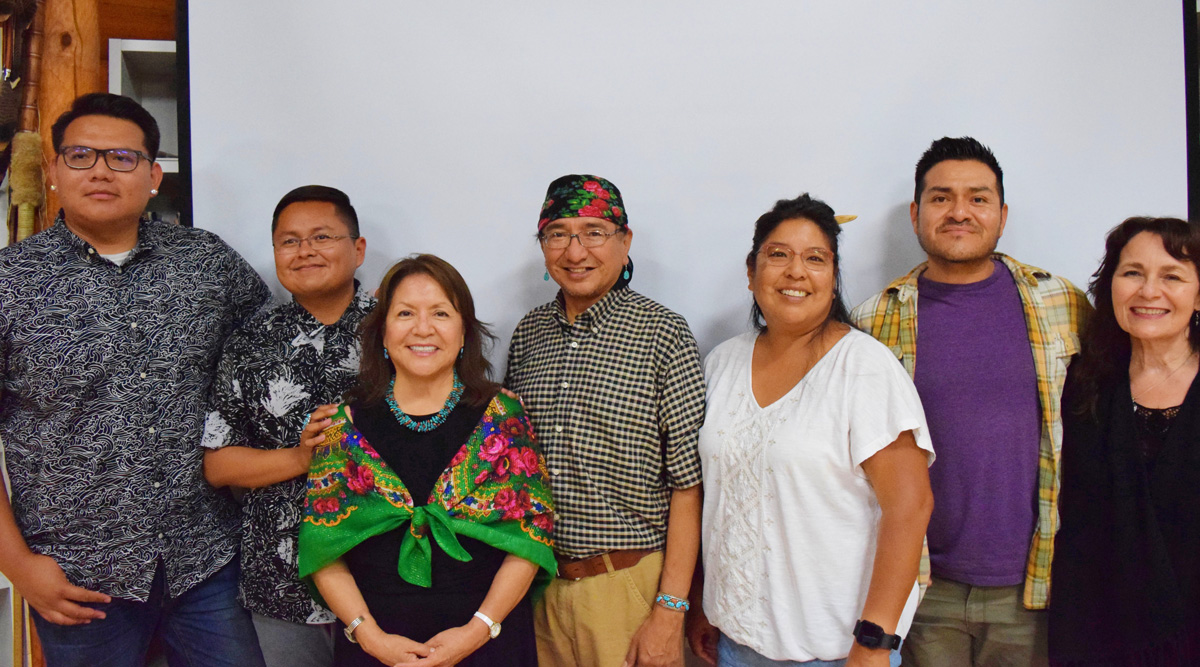
The Institute brings together acclaimed Diné writers and authors to serve as faculty mentors. We also collaborate with institutions like the University of Wisconsin-Milwaukee and the Northern Arizona University to bring non-Diné writers and authors to campus. EDWI participants study with these faculty mentors in poetry, fiction, creative non-fiction, journalism, song writing, and much more. Faculty mentors also include Diné medicine people who share cultural stories.
2023 EDWI Faculty Mentors and Visiting Writers
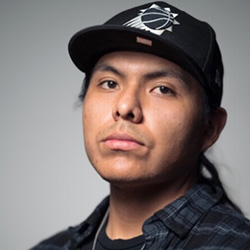 |
Lonnie Begaye is Hałtsoí Dine’é born for Deeshchii’nii. He is from Tsé Na’ashje’ii and currently resides in Ch’ínílį́. He holds a bachelor’s degree in cinematic arts & technology from the Institute of American Indian Arts (IAIA), and an associate’s degree in liberal arts from the New Mexico Military Institute. In his storytelling and screenwriting, Begaye applies the skills and knowledge he learned from the IAIA to bring light to life on the Navajo Nation. He writes and expresses his creative ideas while learning the cultural teachings and vast knowledge carried by his family and colleagues. |
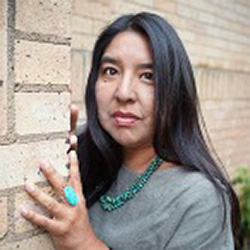 |
Esther G. Belin is a writer, multi-media artist, and citizen of the Navajo Nation. She lives on the Colorado side of the four corners. She has been described as a second-generation off-reservation Native American, a by-product of the US federal Indian policies of termination and relocation. Both of her parents were taken off the Navajo reservation when they were teens to a federally run Indian boarding school in Riverside, CA. There they received the equivalency of an 8th-grade education and some basic trade skills. As a result, she was raised in the Los Angeles area, where she learned to transplant and strengthen her Diné worldview with the help of her parents and the small Indian community that remains there. She is grateful for those courageous relocatees who survived and adapted; their collective scar tissue has eased her path in life. Belin’s art and writing reflect the historical trauma from those policies as well as the philosophy of Saah Naagháí Bik’eh Hózho, the worldview of the Navajo people. Her writing is widely anthologized, and her poetry examines identity politics, checkerboard land status, and the interplay of words (abstraction) and image (realism). In 2000, she was awarded an American Book Award for her first book of poetry, From the Belly of My Beauty. Her most recent poetry collection is Of Catrography: Poems. She holds degrees from Antioch University, the Institute of American Indian Arts, and the University of California at Berkeley. |
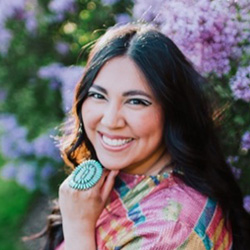 |
Stacie Denetsosie is Todích'íí'nii born for Naakaii Dine’é; her maternal grandparents are the Tł'ízí lání and her paternal step-grandparents are Bilagáana. She is from Kayenta, Arizona but currently resides in Logan, Utah. She holds an M.F.A. in Fiction from the Institute of American Indian Arts. Denetsosie's short story collection The Missing Morningstar And Other Stories debuts September 12th from Torrey House Press. |
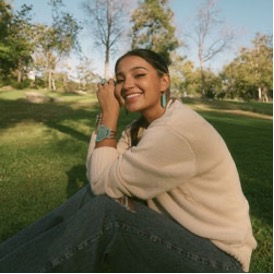 |
Kinsale Drake is Nát’oh Dine’é Táchii’niii born for Bilagáana; her maternal grandparents are the ‘Áshįįhi and her paternal grandparents are the Bilagáana. Drake is a writer and narrator whose work has appeared in The Adroit Journal, Yale Literary Magazine, TIME, New World Coming (Torrey House Press, 2021), her zine Hummingbird Heart (Abalone Mountain Press, 2022), and elsewhere. She is an In-Na-Po Fellow, and the recent winner of the Academy of American Poets/Sean T. Lannan Poetry Prize, and the Young Native Playwrights Award. Her work is forthcoming in Poetry Online, Poets.org, The Languages of our Love (Abalone Mountain Press, 2022), and elsewhere. |
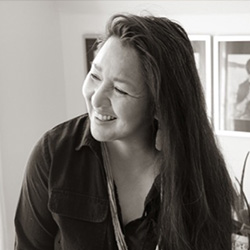 |
Ramona Emerson is Tł’áá'shchí'í born for Naakaii Dine’é. Her maternal grandparents are Táchii’nii and her paternal grandparents are the Naakaii Dine’é. She is a writer and filmmaker originally from Tohatchi, New Mexico. She received her degree in Media Arts in 1997 from the University of New Mexico and her MFA in Creative Writing (Fiction) in 2015 from the Institute of American Indian Arts. She has worked as a professional cinematographer, writer, and editor for over twenty-five years and is currently working on her 8th film project, Crossing the Line. She is an Emmy nominee, a Sundance Native Lab Fellow, a Time-Warner Storyteller Fellow, a Tribeca All-Access Grantee and a WGBH Producer Fellow. Ramona just released her first novel, Shutter the first of a trilogy, which was published with SOHO Books in 2022 and was recently longlisted for the National Book Award and was a finalist for the PEN/Open Book and PEN/Hemingway Award. She currently resides in Albuquerque, New Mexico where she and her husband/producer, Kelly Byars run their production company Reel Indian Pictures. |
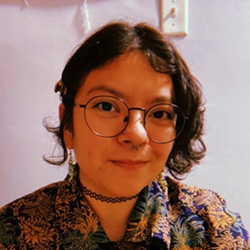 |
Julie Fiveash is Kinyaa’áanii born for Naakai Dine’é. Their maternal grandfather’s clan is Táchii’nii and their paternal grandfather is Bilagáana. Julie’s pronouns are they/them/theirs and they identify as non-binary. They are from Yuma, Arizona and currently reside in Boston, MA. They received their B.A. in Studio Art from Dartmouth College. They lived in San Francisco shortly after graduating and managed a comic bookstore while traveling to sell their work at zinefests and comic festivals throughout the West Coast. Their work has been featured in two Dirty Diamond comic anthologies, the “Baylies” by Laneha House, “Portals of Indigenous Futurisms” by Abalone Mountain Press, “The Out Side: Trans and Non-binary Comics” by Andrews-McMeel Publishing, and they are currently working on a graphic novel to be published through Levine Querido. They hold a MLIS degree from UCLA and currently work at Harvard University’s Tozzer Library as the Librarian for American Indigenous Studies where they prioritize developing ways that the library can create inclusive research spaces and guides for Indigenous researchers and students. |
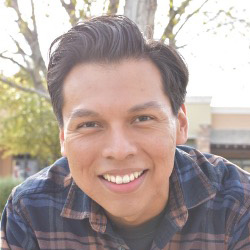 |
Chris Hoshnic is Kin Łichíí’nii, born for Táchíí’nii; his maternal grandfathers are the Bit’ahnii and his paternal grandfathers are Áshįįhnii. He is from Tó Łikan (Sweetwater) in Arizona. Hoshnic is in the final year of his Bachelor of Arts in English at Arizona State University. In 2013, he graduated with an Associates in Applied Science with a concentration in Video Production at Glendale Community College. Hoshnic then went on to write, direct and produce under his production company C&M Imagine. His 5-minute short film “Ozzy” was accepted into the 2018 Jerome International Film Festival. He was also a finalist in short screenplay competitions at Austin Micro Film Festival and the Phoenix Film Festival. In 2022, he was a Ha’a’aahdę́ę́' Writing Fellow with the Emerging Diné Writers’ Institute (EDWI) under his mentor Ramona Emerson. He is currently writing fiction and planning to attend graduate school to further his studies in creative writing. He recently presented a multilingual community poem titled “The Landscapes of Languages” at the 2023 Northern Arizona Book Festival for the Thousand Languages Project. In the summer of 2023, Chris became a fellow of the Native American Media Alliance’s Native American Writers Seminar. |
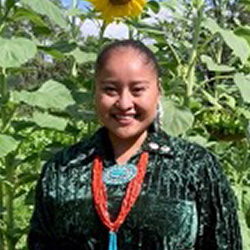 |
Crystal Littleben is Kin Łichíi’nii’, born for Ma’ii Deeshgiizhnii; her maternal grandparents are the Bįįh Bitoo’nii, and. her paternal grandparents are the Bit’ahnii. She is originally from Tuba City, Arizona but was raised in Round Rock, Arizona. Littleben also served as Miss Navajo Nation from September 2017 to 2018. She is currently the Program Manager for the Navajo Cultural Arts Program at Diné College in Tsaile, AZ. Littleben graduated from Northern Arizona University with a Bachelor of Arts degree in Psychology with a minor in Native American Studies. She is currently seeking her BFA in Navajo Silversmithing at Diné College, and she is pursuing her Masters of Fine Arts in Cultural Arts Administration from the Institute for American Indian Arts in Santa Fe, NM. In addition to being a Program Manager, she also owns a silversmithing business called Leading with Fire: Asdzáá Atsidí. Littleben has shown and sold her jewelry at the Heard Museum Indian Art Market since 2020 and will be doing her first show in Santa Fe at SWAIA this coming August. Littleben identifies as a silversmith, educator, advocate, and student. She believes firmly in the cultural arts and stories of Navajo people as a catalyst for positive social and cultural enrichment. |
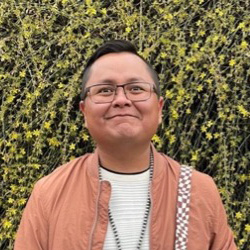 |
Manny Loley is ‘Áshįįhi born for Tó Baazhní’ázhí; his maternal grandparents are the Tódích’íi’nii and his paternal grandparents are the Kinyaa’áanii. Loley holds a Ph.D. in English and literary arts from the University of Denver, and an M.F.A. in fiction from the Institute of American Indian Arts. Loley is an inaugural In-Na-Po Fellow, and a member of Saad Bee Hózhǫ́: Diné Writers’ Collective. Since 2018, he has served as director of the Emerging Diné Writers’ Institute. His work has found homes in Poetry Magazine, Pleaides Magazine, the Massachusetts Review, the Santa Fe Literary Review, Broadsided Press, the Yellow Medicine Review, and the Diné Reader: an Anthology of Navajo Literature, among others. His writing has been thrice nominated for Pushcart Prizes. Loley is at work on a novel titled They Collect Rain in Their Palms. He is from Tsétah Tó Ák’olí in New Mexico. |
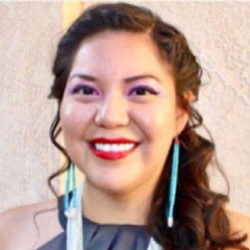 |
Amber McCrary is Kin Łichíi’nii born for Naakaii Dine’é; her maternal grandparents are the ‘Áshįįhi and her paternal grandparents are the Ta’neeszahnii. She is from Shonto, Arizona. McCrary is a Diné poet, zinester, and feminist. She holds an M.F.A. in poetry from Mills College in Oakland, California. McCrary is the author of the chapbook Electric Deserts (Tolsun Books). She is the 2020 EDWI Lead Author and the core faculty for poetry. |
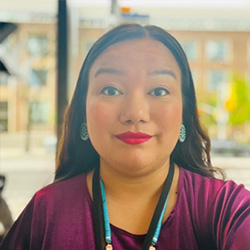 |
Shaina A. Nez is Táchii’nii born for Áshįįhi. She is Senior Lecturer in Creative Writing and English at Diné College. She is also a doctoral candidate in Justice Studies with the School of Social Transformation and Inquiry at Arizona State University. Nez earned her M.F.A. in creative nonfiction from the Institute of American Indian Arts in Santa Fe, New Mexico. Her work has appeared in “A Gathering of Native Voices” (The Massachusetts Review), “Nonwhite and Women: 131 Micro-Essays on Being in the World,” winner of the 2023 Silver IPPY award in the category of Adult Multicultural Nonfiction, “Between Pleasure and Pain: An Authentic Voices Anthology” (Sunday Dinner Publishing), and Issue 14: Indigenous Ecopoetry (Green Linden Press). She is an alum of Tin House, VONA (Voices of Our Nation Arts Foundation), WNDB (We Need Diverse Books), AV 2022 (Authentic Voices Fellowship) by the Women’s National Book Association, and a recipient of the 2021 Open Door Career Advancement Grants for Black, Indigenous, People of Color (BIPOC) women writers. |
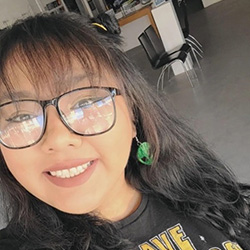 |
Natalya “Tasha” Nez is Tsi’naajínii, born for Dibé Łizhiní; her maternals grandparents are the Tódích’íi’nii and her paternal grandparents are the Tábąąhá. She is a self-taught mixed-media artist born in Gallup, New Mexico and raised in Chichiltah and Ramah-Navajo reservation. She holds an associate degree in human services from the University of New Mexico-Gallup. For the past six years, she worked as the Program Coordinator for gallupARTS, a non-profit arts council in McKinley County where she led art workshops and various public art programs, managed an art gallery, curated art shows and was the in-house graphic designer. Currently, she has taken the big step to pursue her dream of being a full-time artist. Her collage work has recently won recognition in the National Collage Society’s 26th Annual Small Format Exhibition and a few of her monotypes have won an excellence ribbon in a juried show titled, “Honoring the Families of Navajo Code Talkers.” She also has four of her social justice artworks on view in the Navajo Nation Museum titled, “Cause/Casuse.” She has also been commissioned by the Public Lands Interpretive Association to create art that will be displayed at the El Malpais Conservation Ranger Station. Nez creates paper collages using monoprints, block prints, photographs and found images. She also creates watercolor, acrylic and oil paintings. She is currently expanding her art practice by learning about cyanotypes, oil painting en plein air and silversmithing. Her work is largely inspired by Diné Bikéyah (the lands around and on the Navajo Nation), Diné culture, and her childhood living in New Mexico. Her goal as an artist is to inspire others to look for the extraordinary in the ordinary. Nez also uses her art to address different social justice issues that are important to her. She has found that art can be a powerful catalyst for change and creates avenues for important dialogue on difficult topics. Her work and upcoming shows can be found on her Instagram page: @pacotacorox. |
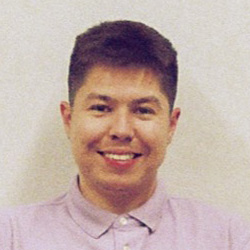 |
Dillen Peace is Ta’neeszahnii and his father is of Anglo descent; his maternal grandparents are the Kin Łichíí’nii and his paternal grandparents are of Angle descent. Peace was raised near the landmark Tsé Bitsii' on the west side of Tsé Nitsaa Deez’áhí (Rock Point). He received his B.A. in Studio Art and Native American Studies from Dartmouth College in 2019. In 2023, Peace completed his M.F.A. in Visual Art and a Graduate Certificate in Indigenous Studies from the University of Kansas. He is a former Ha’a’aahdę́ę́' Writing Fellow with the Emerging Diné Writers’ Institute (EDWI). |
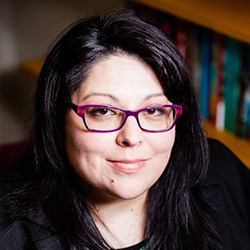 |
Natanya Ann Pulley’s clans are Kinyaa’áanii and Táchii’nii. She is published in McSweeney's, Split Lip, and The Offing(among others). Her essays have been anthologized in Shapes of Native Nonfiction, The Diné Reader, and Unbound: Composing Home. She is a 2022 recipient of a NEA Creative Writing fellowship and her short story collection With Teeth is a winner in the 2018 Many Voices Project book competition with New Rivers Press. Natanya is an associate professor and editor of Hairstreak Butterfly Review at Colorado College where she teaches texts by Native American writers, fiction writing, and experimental forms. |
 |
Sabrina Saleha is a screenwriter and actress. She recently graduated with her Master of Fine Arts in Screenwriting from the Institute of American Indian Arts in May 2023, Sabrina has been recognized with scholarships from Warner Bros. Discovery, American Indian Circle Fellow and Navajo Nation. She was also a '22 Native American Media TV Writer's Lab fellow with SkinsFest and currently a ‘23 ImagineNATIVE’s Screenwriting Feature Lab fellow sponsored by Netflix. Her most recent acting credits include BARRY, SINGLE DRUNK FEMALE, PANHANDLE and ECHOES. Her voiceover work will be in the upcoming Playstation video game, THE FOGLANDS. |
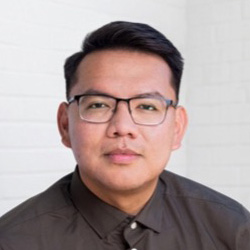 |
Jake Skeets is Tsi’naajínii born for Tábąąhá; his maternal grandparents are the Táchii’nii and his paternal grandparents are the Tódík’ózhí. Skeets is from Vanderwagen, New Mexico. He is the author of Eyes Bottle Dark with a Mouthful of Flowers, winner of the National Poetry Series, American Book Award, Kate Tufts Discovery Award, and Whiting Award. His poetry and prose have appeared widely in journals and magazines such as Poetry, The New York Times, and The Paris Review. He holds an M.F.A. in Poetry from the Institute of American Indian Arts. His honors include a National Endowment for the Arts Grant for Arts Projects, a Mellon Projecting All Voices Fellowship, and the 2023-2024 Grisham Writer in Residence at the University of Mississippi. He teaches at the University of Oklahoma. |

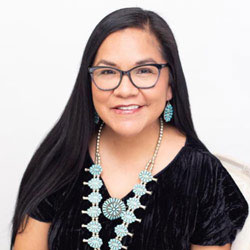 Jolyana Begay-Kroupa is Táchii’nii born for Tsinaajinii; her maternal grandparents are the Tł’ááshchí’í and her paternal grandparents are the Yée’ii Dine’é Táchii’nii. She is from Ts’iłdiilyesiitah (Rabbitbrush) near Fort Defiance, Arizona. She honorably served as the 50th Miss Navajo Nation (2001-2002). She currently resides in the Phoenix-Metro area where she is a Director of Development for Phoenix Indian Center specializing in language and culture revitalization and prevention programs. She has a Master of Arts in Social and Philosophical Foundations of Education with an emphasis in American Indian Education Policy and a Bachelor of Arts in Elementary Education with a Navajo language endorsement, both from Arizona State University. In addition to her work at Phoenix Indian Center, she currently teaches Navajo language classes at Arizona State University and Stanford University. She has also taught for Harvard University and Yale University. Language learning is her passion and she is an advocate on the importance of language revitalization. She is married and has three beautiful children.
Jolyana Begay-Kroupa is Táchii’nii born for Tsinaajinii; her maternal grandparents are the Tł’ááshchí’í and her paternal grandparents are the Yée’ii Dine’é Táchii’nii. She is from Ts’iłdiilyesiitah (Rabbitbrush) near Fort Defiance, Arizona. She honorably served as the 50th Miss Navajo Nation (2001-2002). She currently resides in the Phoenix-Metro area where she is a Director of Development for Phoenix Indian Center specializing in language and culture revitalization and prevention programs. She has a Master of Arts in Social and Philosophical Foundations of Education with an emphasis in American Indian Education Policy and a Bachelor of Arts in Elementary Education with a Navajo language endorsement, both from Arizona State University. In addition to her work at Phoenix Indian Center, she currently teaches Navajo language classes at Arizona State University and Stanford University. She has also taught for Harvard University and Yale University. Language learning is her passion and she is an advocate on the importance of language revitalization. She is married and has three beautiful children.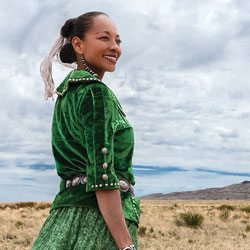 Radmilla Cody is Tł’áá'shchí'í born for Naahiłí (African Americans). Cody holds a Bachelors of Science in public relations with a minor in sociology. She is a Grammy nominee, multiple Native American Music Awards winner, 46th Miss Navajo, one of NPR’s 50 Great Voices, a Black History Maker honoree, co-founder of the Shimá Storytelling Literacy Program, founder of the “Strong Spirit: Life is Beautiful, Not Abusive” campaign, and an advocate against domestic abuse and violence. Cody also co-founded the radical space K’é Infoshop based in Window Rock, AZ, where direct work and action is prioritized to educate, organize and strengthen k’é/kinship with all oppressed relatives. Cody is the subject of an award-winning documentary titled “Hearing Radmilla” produced and directed by Angela Webb, which further explores Radmilla’s journey as an activist and international performer. Cody has released multiple award-winning albums including Within the Four Directions, Seed of Life, Spirit of a Woman, Shi Keyah, and many more. For more information or to contact her, see www.radmillacody.com.
Radmilla Cody is Tł’áá'shchí'í born for Naahiłí (African Americans). Cody holds a Bachelors of Science in public relations with a minor in sociology. She is a Grammy nominee, multiple Native American Music Awards winner, 46th Miss Navajo, one of NPR’s 50 Great Voices, a Black History Maker honoree, co-founder of the Shimá Storytelling Literacy Program, founder of the “Strong Spirit: Life is Beautiful, Not Abusive” campaign, and an advocate against domestic abuse and violence. Cody also co-founded the radical space K’é Infoshop based in Window Rock, AZ, where direct work and action is prioritized to educate, organize and strengthen k’é/kinship with all oppressed relatives. Cody is the subject of an award-winning documentary titled “Hearing Radmilla” produced and directed by Angela Webb, which further explores Radmilla’s journey as an activist and international performer. Cody has released multiple award-winning albums including Within the Four Directions, Seed of Life, Spirit of a Woman, Shi Keyah, and many more. For more information or to contact her, see www.radmillacody.com.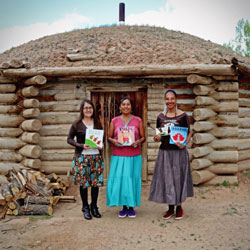 Pauletta Chief-Lee is Tódích’íí’nii born for Tó'áhaní; her maternal grandparents are the Tł’ízíłaní and her paternal grandparents are the Yé’ii Dine’é Táchii’nii. She is co-founder of the Shimá Storytelling Literacy Program, where she works with two other educated Diné mothers who develop and implement Diné curriculum for people of all ages. As a Diné language learning program, Shimá Storytelling focuses their work in Diné communities that lack educational programming for children five and under. Chief-Lee writes songs in the Diné language so parents and guardians can easily follow along. She also reads Diné language storybooks for various language and community groups. Chief-Lee is also a Registered Dietitian Nutritionist (RDN) and a stay-at-home mother. She speaks and teaches Diné bizaad to her children in their bilingual home. She loves to write in Diné bizaad and actively reads the Navajo Bible and other Diné language books. She is pleased to work with a Diné teaching program that has become a resource for families who desire to enrich and relearn their Diné language.
Pauletta Chief-Lee is Tódích’íí’nii born for Tó'áhaní; her maternal grandparents are the Tł’ízíłaní and her paternal grandparents are the Yé’ii Dine’é Táchii’nii. She is co-founder of the Shimá Storytelling Literacy Program, where she works with two other educated Diné mothers who develop and implement Diné curriculum for people of all ages. As a Diné language learning program, Shimá Storytelling focuses their work in Diné communities that lack educational programming for children five and under. Chief-Lee writes songs in the Diné language so parents and guardians can easily follow along. She also reads Diné language storybooks for various language and community groups. Chief-Lee is also a Registered Dietitian Nutritionist (RDN) and a stay-at-home mother. She speaks and teaches Diné bizaad to her children in their bilingual home. She loves to write in Diné bizaad and actively reads the Navajo Bible and other Diné language books. She is pleased to work with a Diné teaching program that has become a resource for families who desire to enrich and relearn their Diné language.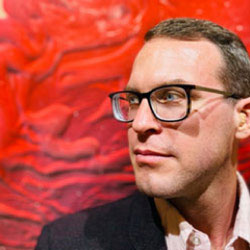 Will Cordeiro teaches creative writing workshops and interdisciplinary seminars for Northern Arizona University's Honors College. Will's work is published or forthcoming in AGNI, Bennington Review, Cimarron Review, The Cincinnati Review, Copper Nickel, The Threepenny Review, THRUSH, and elsewhere. Will’s collection Trap Street won the 2019 Able Muse Book Award. Will is also co-author of Experimental Writing: A Writers' Guide and Anthology, forthcoming from Bloomsbury. Will co-edits the small press Eggtooth Editions and is grateful for a grant from the Arizona Commission on the Arts. Will received an MFA and Ph.D. from Cornell University.
Will Cordeiro teaches creative writing workshops and interdisciplinary seminars for Northern Arizona University's Honors College. Will's work is published or forthcoming in AGNI, Bennington Review, Cimarron Review, The Cincinnati Review, Copper Nickel, The Threepenny Review, THRUSH, and elsewhere. Will’s collection Trap Street won the 2019 Able Muse Book Award. Will is also co-author of Experimental Writing: A Writers' Guide and Anthology, forthcoming from Bloomsbury. Will co-edits the small press Eggtooth Editions and is grateful for a grant from the Arizona Commission on the Arts. Will received an MFA and Ph.D. from Cornell University.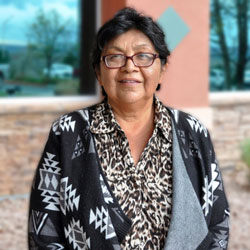 Dr. Jennifer Nez Denetdale is Tł’ógí born for ‘Áshįįhi; her maternal grandparents are the Kin Łichíi’nii and her paternal grandparents are the Tó’aheedlíinii. Dr. Denetdale is a professor of American Studies at the University of New Mexico. She is the author of Reclaiming Diné History: The Legacies of Chief Manuelito and Juanita, two books for young adults, and she has published numerous essays, articles, and book chapters. She has been recognized for her scholarship and service to the Diné Nation with several awards, including the Rainbow Nááts’íílid True Colors for her support and advocacy on behalf of the Navajo LGBTQI, the UNM Sarah Brown Belle award for service to her community, and UNM’s Presidential Award for Distinction. Dr. Denetdale is the recipient of the Women’s International Study Center Fellowship and the Newberry Consortium of American Indian Studies Fellowship, both in 2019. In 2020, Dr. Denetdale was awarded UNM’s 6th Annual Community Engaged Research Lectureship. She is the chair of the Navajo Nation Human Rights Commission (NNHRC).
Dr. Jennifer Nez Denetdale is Tł’ógí born for ‘Áshįįhi; her maternal grandparents are the Kin Łichíi’nii and her paternal grandparents are the Tó’aheedlíinii. Dr. Denetdale is a professor of American Studies at the University of New Mexico. She is the author of Reclaiming Diné History: The Legacies of Chief Manuelito and Juanita, two books for young adults, and she has published numerous essays, articles, and book chapters. She has been recognized for her scholarship and service to the Diné Nation with several awards, including the Rainbow Nááts’íílid True Colors for her support and advocacy on behalf of the Navajo LGBTQI, the UNM Sarah Brown Belle award for service to her community, and UNM’s Presidential Award for Distinction. Dr. Denetdale is the recipient of the Women’s International Study Center Fellowship and the Newberry Consortium of American Indian Studies Fellowship, both in 2019. In 2020, Dr. Denetdale was awarded UNM’s 6th Annual Community Engaged Research Lectureship. She is the chair of the Navajo Nation Human Rights Commission (NNHRC).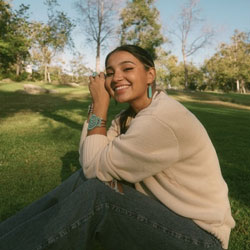 Kinsale Drake is Nát’oh Dine’é Táchii’niii born for Bilagáana; her maternal grandparents are the ‘Áshįįhi and her paternal grandparents are the Bilagáana. Drake is a writer and narrator whose work has appeared in The Adroit Journal, Yale Literary Magazine, TIME, New World Coming (Torrey House Press, 2021), her zine Hummingbird Heart (Abalone Mountain Press, 2022), and elsewhere. She is an In-Na-Po Fellow, and the recent winner of the Academy of American Poets/Sean T. Lannan Poetry Prize, and the Young Native Playwrights Award. Her work is forthcoming in Poetry Online, Poets.org, The Languages of our Love (Abalone Mountain Press, 2022), and elsewhere.
Kinsale Drake is Nát’oh Dine’é Táchii’niii born for Bilagáana; her maternal grandparents are the ‘Áshįįhi and her paternal grandparents are the Bilagáana. Drake is a writer and narrator whose work has appeared in The Adroit Journal, Yale Literary Magazine, TIME, New World Coming (Torrey House Press, 2021), her zine Hummingbird Heart (Abalone Mountain Press, 2022), and elsewhere. She is an In-Na-Po Fellow, and the recent winner of the Academy of American Poets/Sean T. Lannan Poetry Prize, and the Young Native Playwrights Award. Her work is forthcoming in Poetry Online, Poets.org, The Languages of our Love (Abalone Mountain Press, 2022), and elsewhere.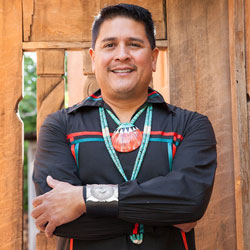 Max Early is from Laguna Pueblo. His clans are Tsina Hanu (Turkey People) and Kwaya Waashch’ee (Child of the Bear). He writes in both English and his native Keresan language. Early holds an M.F.A. in poetry from the Institute of American Indian Arts and a BA in English and creative writing from the University of New Mexico. He has received fellowships from Writing By Writers, Orion in the Wilderness, the School of Advanced Research in Santa Fe, New Mexico, and the Taos Summer Writers’ Conference. His work has appeared in Inkwell Journal and Poetry Northwest. He is the author of Ears of Corn: Listen from 3: A Taos Press. In addition to being a writer, Early also works in clay, creating innovative and beautiful pottery. He lives in the village of Paguate, New Mexico.
Max Early is from Laguna Pueblo. His clans are Tsina Hanu (Turkey People) and Kwaya Waashch’ee (Child of the Bear). He writes in both English and his native Keresan language. Early holds an M.F.A. in poetry from the Institute of American Indian Arts and a BA in English and creative writing from the University of New Mexico. He has received fellowships from Writing By Writers, Orion in the Wilderness, the School of Advanced Research in Santa Fe, New Mexico, and the Taos Summer Writers’ Conference. His work has appeared in Inkwell Journal and Poetry Northwest. He is the author of Ears of Corn: Listen from 3: A Taos Press. In addition to being a writer, Early also works in clay, creating innovative and beautiful pottery. He lives in the village of Paguate, New Mexico.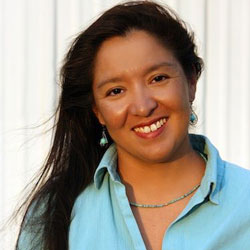 Ramona Emerson is a Diné writer and filmmaker originally from Tohatchi, New Mexico. She received her degree in media arts in 1997 from the University of New Mexico and her M.F.A. in creative writing (fiction) in 2015 from the Institute of American Indian Arts. She has worked as a professional videographer, writer, and editor for over twenty years and is currently working on her 8th film project, Crossing the Line. She is an Emmy nominee, a Sundance Native Lab Fellow, a Time-Warner Storyteller Fellow, a Tribeca All-Access Grantee, and a WGBH Producer Fellow. In 2020, Emerson was appointed to the Governor’s Council on Film and Media Industries for the State of New Mexico. Emerson just finished her first novel, Shutter the first of a trilogy, and is now working toward publishing and adapting the series into a screenplay. Through her storytelling, Emerson looks at contemporary stories about her people and aims to question and redefine the expectations of Native cultural identity, highlighting stories that are not a part of mainstream media. She currently resides in Albuquerque, New Mexico where she and her husband/producer, Kelly Byars, run their production company Reel Indian Pictures.
Ramona Emerson is a Diné writer and filmmaker originally from Tohatchi, New Mexico. She received her degree in media arts in 1997 from the University of New Mexico and her M.F.A. in creative writing (fiction) in 2015 from the Institute of American Indian Arts. She has worked as a professional videographer, writer, and editor for over twenty years and is currently working on her 8th film project, Crossing the Line. She is an Emmy nominee, a Sundance Native Lab Fellow, a Time-Warner Storyteller Fellow, a Tribeca All-Access Grantee, and a WGBH Producer Fellow. In 2020, Emerson was appointed to the Governor’s Council on Film and Media Industries for the State of New Mexico. Emerson just finished her first novel, Shutter the first of a trilogy, and is now working toward publishing and adapting the series into a screenplay. Through her storytelling, Emerson looks at contemporary stories about her people and aims to question and redefine the expectations of Native cultural identity, highlighting stories that are not a part of mainstream media. She currently resides in Albuquerque, New Mexico where she and her husband/producer, Kelly Byars, run their production company Reel Indian Pictures.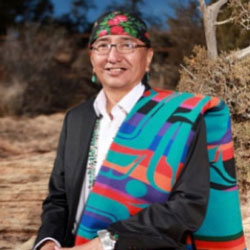 Rex Lee Jim is Kin Łichíi’nii born for Táchii’nii; his maternal grandparents are the Kinyaa’áanii and his paternal grandparents are the Naakaii Dine’é. Jim is from Rock Point, Arizona. A poet, playwright, and medicine man, Jim attended Princeton University, Middlebury Bread Loaf School of English, and Oxford University in England. He is fluent in Navajo, English, and Spanish. Although known mostly for his political career as former Navajo Nation Vice-President, Jim has extensive experience as a writer. He is an accomplished poet and has written three collections of poetry including: Saad Lá Tah Hozhóon (2019), which is a reprint of Jim’s trilingual collection of poetry titled Duchas Taa Koo Diné: a trilingual poetry collection in Navajo, Irish, and English (1998); Saad (1995); and Áhí Ni’Nikisheegiizh (1989). Jim continues to reside in his home community of Rock Point and he currently works at Diné College in Tsaile, Arizona.
Rex Lee Jim is Kin Łichíi’nii born for Táchii’nii; his maternal grandparents are the Kinyaa’áanii and his paternal grandparents are the Naakaii Dine’é. Jim is from Rock Point, Arizona. A poet, playwright, and medicine man, Jim attended Princeton University, Middlebury Bread Loaf School of English, and Oxford University in England. He is fluent in Navajo, English, and Spanish. Although known mostly for his political career as former Navajo Nation Vice-President, Jim has extensive experience as a writer. He is an accomplished poet and has written three collections of poetry including: Saad Lá Tah Hozhóon (2019), which is a reprint of Jim’s trilingual collection of poetry titled Duchas Taa Koo Diné: a trilingual poetry collection in Navajo, Irish, and English (1998); Saad (1995); and Áhí Ni’Nikisheegiizh (1989). Jim continues to reside in his home community of Rock Point and he currently works at Diné College in Tsaile, Arizona.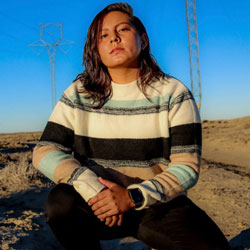 Boderra Joe is Bit’ahnii born for Tó’áhani. She is a poet, journalist, and photographer from Bááhztł’ah (Twin Lakes), New Mexico, on the Navajo Nation. Joe holds an M.F.A. and B.F.A. from the Institute of American Indian Arts, where she serves as Program Coordinator for the M.F.A. in Creative Writing program. Joe’s first collection of poetry titled Desert Teeth is forthcoming from Abalone Mountain Press in August 2022. She currently resides in Santa Fe, New Mexico.
Boderra Joe is Bit’ahnii born for Tó’áhani. She is a poet, journalist, and photographer from Bááhztł’ah (Twin Lakes), New Mexico, on the Navajo Nation. Joe holds an M.F.A. and B.F.A. from the Institute of American Indian Arts, where she serves as Program Coordinator for the M.F.A. in Creative Writing program. Joe’s first collection of poetry titled Desert Teeth is forthcoming from Abalone Mountain Press in August 2022. She currently resides in Santa Fe, New Mexico.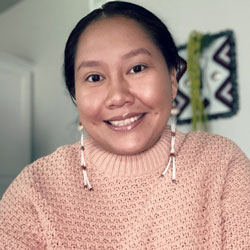 Blossom Johnson is Yé’ii Dine’é Táchii’nii. She is a Diné storyteller, playwright, teaching artist, dramaturg, and screenwriter. Johnson has been commissioned by AlterTheater Ensemble and has been awarded a residency with Willowtail Springs/Durango PlayFest. She is excited to make a smooth transition from theater to film narrative with the In Progress NEXUS Program in St. Paul, MN. Additionally, she has been awarded the 2022 First Peoples Fund Cultural Capital Fellowship, La Lengua/AlterTheater Ensemble's Decolonization Stories Commission 2022 and is proud to be a recipient of The Playwrights’ Center 2022-23 Jerome Fellowship. She is a mentee in writing for animation with the Netflix Animation Foundations Program 2022. As a dramaturg, Johnson has worked with Native Voices at the Autry, UCSB Launch Pad, PlayPenn, Urbanite Theatre, New Native Theatre and YIPAP (Yale Indigenous Performing Arts Program). She has served as a panelist and script reader for the 22' Playwrights' Center Many Voices Fellowship and the 22' New Harmony Project. Johnson holds an M.F.A in dramaturgy from Columbia University and a BA in Theatre from Arizona State University. She is a proud member of the Dramatists Guild, and the Literary Managers and Dramaturgs of the Americas (LMDA).
Blossom Johnson is Yé’ii Dine’é Táchii’nii. She is a Diné storyteller, playwright, teaching artist, dramaturg, and screenwriter. Johnson has been commissioned by AlterTheater Ensemble and has been awarded a residency with Willowtail Springs/Durango PlayFest. She is excited to make a smooth transition from theater to film narrative with the In Progress NEXUS Program in St. Paul, MN. Additionally, she has been awarded the 2022 First Peoples Fund Cultural Capital Fellowship, La Lengua/AlterTheater Ensemble's Decolonization Stories Commission 2022 and is proud to be a recipient of The Playwrights’ Center 2022-23 Jerome Fellowship. She is a mentee in writing for animation with the Netflix Animation Foundations Program 2022. As a dramaturg, Johnson has worked with Native Voices at the Autry, UCSB Launch Pad, PlayPenn, Urbanite Theatre, New Native Theatre and YIPAP (Yale Indigenous Performing Arts Program). She has served as a panelist and script reader for the 22' Playwrights' Center Many Voices Fellowship and the 22' New Harmony Project. Johnson holds an M.F.A in dramaturgy from Columbia University and a BA in Theatre from Arizona State University. She is a proud member of the Dramatists Guild, and the Literary Managers and Dramaturgs of the Americas (LMDA). Lawrence Lenhart is the author of The Well-Stocked and Gilded Cage (Outpost 19). His prose appears in publications like the Alaska Quarterly Review, Fourth Genre, Guernica, Gulf Coast, Passages North, Prairie Schooner, Western Humanities Review, and elsewhere. He teaches fiction and creative nonfiction at Northern Arizona University. Lenhart is an editor at DIAGRAM and a frequent writer for The Rumpus and Brazos Bookstore. He holds an M.F.A. from the University of Arizona.
Lawrence Lenhart is the author of The Well-Stocked and Gilded Cage (Outpost 19). His prose appears in publications like the Alaska Quarterly Review, Fourth Genre, Guernica, Gulf Coast, Passages North, Prairie Schooner, Western Humanities Review, and elsewhere. He teaches fiction and creative nonfiction at Northern Arizona University. Lenhart is an editor at DIAGRAM and a frequent writer for The Rumpus and Brazos Bookstore. He holds an M.F.A. from the University of Arizona.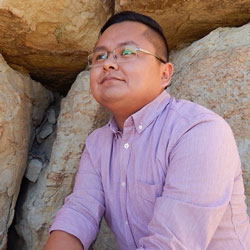 Manny Loley is ‘Áshįįhi born for Tó Baazhní’ázhí; his maternal grandparents are the Tódích’íi’nii and his paternal grandparents are the Kinyaa’áanii. Loley holds an M.F.A. in fiction from the Institute of American Indian Arts, and he is a current Ph.D. candidate in English and literary arts at the University of Denver. Loley is an inaugural In-Na-Po Fellowm, and a member of Saad Bee Hózhǫ́: Diné Writers’ Collective. He is the director of the Emerging Diné Writers’ Institute and the program coordinator for Six Directions: Indigenous Creative Writing Program through Lighthouse Writers Workshop in Denver, CO. His work has found homes in Poetry Magazine, Pleaides Magazine, the Massachusetts Review, the Santa Fe Literary Review, Broadsided Press, the Yellow Medicine Review, and the Diné Reader: an Anthology of Navajo Literature, among others. His writing has been thrice nominated for Pushcart Prizes. Loley is at work on a novel titled They Collect Rain in Their Palms. He is from Tsétah Tó Ák’olí in New Mexico.
Manny Loley is ‘Áshįįhi born for Tó Baazhní’ázhí; his maternal grandparents are the Tódích’íi’nii and his paternal grandparents are the Kinyaa’áanii. Loley holds an M.F.A. in fiction from the Institute of American Indian Arts, and he is a current Ph.D. candidate in English and literary arts at the University of Denver. Loley is an inaugural In-Na-Po Fellowm, and a member of Saad Bee Hózhǫ́: Diné Writers’ Collective. He is the director of the Emerging Diné Writers’ Institute and the program coordinator for Six Directions: Indigenous Creative Writing Program through Lighthouse Writers Workshop in Denver, CO. His work has found homes in Poetry Magazine, Pleaides Magazine, the Massachusetts Review, the Santa Fe Literary Review, Broadsided Press, the Yellow Medicine Review, and the Diné Reader: an Anthology of Navajo Literature, among others. His writing has been thrice nominated for Pushcart Prizes. Loley is at work on a novel titled They Collect Rain in Their Palms. He is from Tsétah Tó Ák’olí in New Mexico.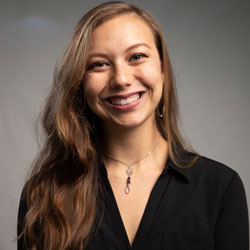 Arielle Taitano Lowe is a Chamorrita poet who tells stories of Indigenous apprenticeship and intergenerational healing. A University of Guam alumna, she is pursuing her Ph.D. in English at the University of Hawai‘i at Mānoa. Her work can be found in Indigenous Literatures from Micronesia, Indigenous Pacific Islander Eco-Poetry, and the Academy of American Poets Poem-a-Day Series.
Arielle Taitano Lowe is a Chamorrita poet who tells stories of Indigenous apprenticeship and intergenerational healing. A University of Guam alumna, she is pursuing her Ph.D. in English at the University of Hawai‘i at Mānoa. Her work can be found in Indigenous Literatures from Micronesia, Indigenous Pacific Islander Eco-Poetry, and the Academy of American Poets Poem-a-Day Series.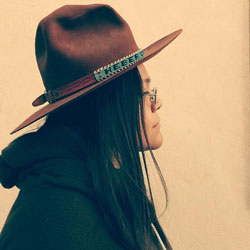 Cheyanne Lozano is Tł’ízí Lání born for the Hispanic people. She lives in El Paso, Texas where she is currently working on earning an M.F.A. in creative writing at the University of Texas at El Paso. At her university she helped found ARISE- The Academic Revival of Indigenous Studies and Education: a student organization devoted to educating their community about Indigenous history, diversity, current events, and current issues. Her goals are to eventually be a creative writing teacher to help others the way writing has helped her. Lozano is an inaugural Hane’ Bee Anoosééł Teaching Fellow for the Emerging Diné Writers’ Institute.
Cheyanne Lozano is Tł’ízí Lání born for the Hispanic people. She lives in El Paso, Texas where she is currently working on earning an M.F.A. in creative writing at the University of Texas at El Paso. At her university she helped found ARISE- The Academic Revival of Indigenous Studies and Education: a student organization devoted to educating their community about Indigenous history, diversity, current events, and current issues. Her goals are to eventually be a creative writing teacher to help others the way writing has helped her. Lozano is an inaugural Hane’ Bee Anoosééł Teaching Fellow for the Emerging Diné Writers’ Institute.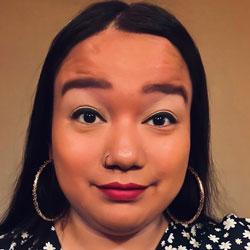 Shaina A. Nez is Táchii’nii born for Áshįįhi. She is a Diné mother, writer, and doctoral student. She earned her M.F.A. in creative nonfiction from the Institute of American Indian Arts in Santa Fe, New Mexico. Her work has appeared in The Massachusetts Review, Yellow Medicine Review, Nonwhite and Woman: 131 Micro Essays on Being in the World from Woodhall Press, Chapter House Magazine, and Abalone Mountain Press. She is a Tin House alumni and a recipient of the 2021 Open Door Career Advancement Grant for BIPOC women writers. She lives in Bloomfield, New Mexico, with her daughter and is a Diné College faculty member in Creative Writing.
Shaina A. Nez is Táchii’nii born for Áshįįhi. She is a Diné mother, writer, and doctoral student. She earned her M.F.A. in creative nonfiction from the Institute of American Indian Arts in Santa Fe, New Mexico. Her work has appeared in The Massachusetts Review, Yellow Medicine Review, Nonwhite and Woman: 131 Micro Essays on Being in the World from Woodhall Press, Chapter House Magazine, and Abalone Mountain Press. She is a Tin House alumni and a recipient of the 2021 Open Door Career Advancement Grant for BIPOC women writers. She lives in Bloomfield, New Mexico, with her daughter and is a Diné College faculty member in Creative Writing.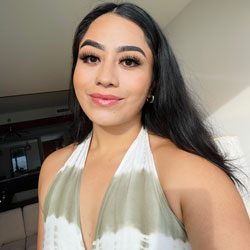 Ha'åni Lucia Falo San Nicolas is a Pacific daughter, teacher, scholar, and poet of CHamoru and Samoan descent. Born and raised in Guåhan, she now resides in O'ahu to pursue a doctorate in Indigenous Politics and an advanced graduate certificate in Women, Gender, and Sexuality Studies at the University of Hawai'i at Mānoa. Ha'åni also holds a graduate assistantship to instruct introductory-level courses for the Department of Political Science. She is a 2022 Indigenous Nations Poets fellow and has published work in the Academy of American Poets Poem-A-Day Series, Changing Wxmen Collective's literary magazine, and more.
Ha'åni Lucia Falo San Nicolas is a Pacific daughter, teacher, scholar, and poet of CHamoru and Samoan descent. Born and raised in Guåhan, she now resides in O'ahu to pursue a doctorate in Indigenous Politics and an advanced graduate certificate in Women, Gender, and Sexuality Studies at the University of Hawai'i at Mānoa. Ha'åni also holds a graduate assistantship to instruct introductory-level courses for the Department of Political Science. She is a 2022 Indigenous Nations Poets fellow and has published work in the Academy of American Poets Poem-A-Day Series, Changing Wxmen Collective's literary magazine, and more. Sarah Elizabeth Schantz is primarily a fiction writer living on the outskirts of Boulder, Colorado in a Victorian-era farmhouse she rents from Open Space where she and her family are surrounded by open sky, coyote, and century-old cottonwoods. Her first novel Fig debuted from Simon & Schuster in 2015 and was selected by NPR as A Best Read of the Year before winning a 2016 Colorado Book Award. She is currently working on two novels—Roadside Altars and Just Like Heaven—as well as a short story collection, Tales of Dead Children. She teaches creative writing as faculty at Lighthouse Writers Workshop, as an adjunct for the Jack Kerouac School of Disembodied Poetics, and through her own private seasonally-inspired workshop series, (W)rites of Passage where she also offers one-on-one writing midwifery and divination.
Sarah Elizabeth Schantz is primarily a fiction writer living on the outskirts of Boulder, Colorado in a Victorian-era farmhouse she rents from Open Space where she and her family are surrounded by open sky, coyote, and century-old cottonwoods. Her first novel Fig debuted from Simon & Schuster in 2015 and was selected by NPR as A Best Read of the Year before winning a 2016 Colorado Book Award. She is currently working on two novels—Roadside Altars and Just Like Heaven—as well as a short story collection, Tales of Dead Children. She teaches creative writing as faculty at Lighthouse Writers Workshop, as an adjunct for the Jack Kerouac School of Disembodied Poetics, and through her own private seasonally-inspired workshop series, (W)rites of Passage where she also offers one-on-one writing midwifery and divination.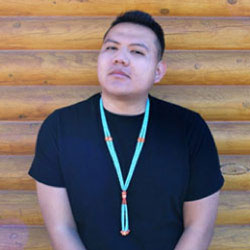 Jake Skeets is Tsi’naajínii born for Tábąąhá; his maternal grandparents are the Táchii’nii and his paternal grandparents are the Tódík’ózhí. Skeets is from Vanderwagen, New Mexico. He is the author of Eyes Bottle Dark with a Mouthful of Flowers, winner of the 2018 National Poetry Series. He holds an M.F.A. in poetry from the Institute of American Indian Arts. His honors include a 92Y Discovery Poetry Prize and 2020 Whiting Award. He is a member of Saad Bee Hózhǫ́: Diné Writers’ Collective. Skeets is an Assistant Professor and teaches at Diné College in Tsaile, Arizona.
Jake Skeets is Tsi’naajínii born for Tábąąhá; his maternal grandparents are the Táchii’nii and his paternal grandparents are the Tódík’ózhí. Skeets is from Vanderwagen, New Mexico. He is the author of Eyes Bottle Dark with a Mouthful of Flowers, winner of the 2018 National Poetry Series. He holds an M.F.A. in poetry from the Institute of American Indian Arts. His honors include a 92Y Discovery Poetry Prize and 2020 Whiting Award. He is a member of Saad Bee Hózhǫ́: Diné Writers’ Collective. Skeets is an Assistant Professor and teaches at Diné College in Tsaile, Arizona. Sean Sam is Bilagáana born for Tsi’naajínii; his maternal grandparents are the Bilagáana and his paternal grandparents are the Naasht'ezhi Dine’é. He holds an M.S. in Professional Writing from Towson University. He is the winner of Terrain.org’s 12th Annual Fiction contest and was a finalist for the James Welch Prize in 2022. His work has appeared or is forthcoming in Salt Hill, Poetry Northwest, and Potomac Review, among other places.
Sean Sam is Bilagáana born for Tsi’naajínii; his maternal grandparents are the Bilagáana and his paternal grandparents are the Naasht'ezhi Dine’é. He holds an M.S. in Professional Writing from Towson University. He is the winner of Terrain.org’s 12th Annual Fiction contest and was a finalist for the James Welch Prize in 2022. His work has appeared or is forthcoming in Salt Hill, Poetry Northwest, and Potomac Review, among other places.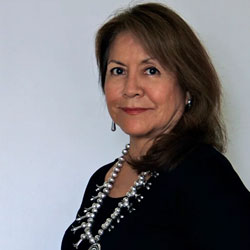 Dr. Laura Tohe is Tsénahabiłnii born for the Tódich’inii. She grew up at the base of the Chuska Mountains in Crystal, New Mexico. Dr. Tohe earned her B.A. from the University of New Mexico and her M.A. and Ph.D. in creative writing and literature from the University of Nebraska in Lincoln. Dr. Tohe is the author of Making Friends with Water; No Parole Today (named Poetry Book of the Year by the Wordcraft Circle of Native American Writers and Storytellers); Sister Nations: Native American Women Writers on Community, co-edited with Heid Erdrich; Tseyí Deep in the Rock, in collaboration with photographer, Stephen Strom (received the Arizona Book Association’s Glyph Award for Best Poetry and Best Book); and Code Talker Stories. The Phoenix Symphony commissioned her to write the libretto for “Enemy Slayer, A Navajo Oratorio,” which made its 2008 world premiere as part of the Phoenix Symphony’s 60th anniversary. A compact disc recording of “Enemy Slayer” is on the Naxos classical music label. It received rave reviews by the Arizona Republic and was called “a triumph” by Opera Today. Her other awards include the Dan Schilling Public Scholar Award by the Arizona Humanities. Dr. Tohe is professor emeritus for Arizona State University and she is the current Navajo Nation Poet Laureate. Dr. Tohe was also named a 2020 Poet Laureate Fellow by the Academy of American Poets.
Dr. Laura Tohe is Tsénahabiłnii born for the Tódich’inii. She grew up at the base of the Chuska Mountains in Crystal, New Mexico. Dr. Tohe earned her B.A. from the University of New Mexico and her M.A. and Ph.D. in creative writing and literature from the University of Nebraska in Lincoln. Dr. Tohe is the author of Making Friends with Water; No Parole Today (named Poetry Book of the Year by the Wordcraft Circle of Native American Writers and Storytellers); Sister Nations: Native American Women Writers on Community, co-edited with Heid Erdrich; Tseyí Deep in the Rock, in collaboration with photographer, Stephen Strom (received the Arizona Book Association’s Glyph Award for Best Poetry and Best Book); and Code Talker Stories. The Phoenix Symphony commissioned her to write the libretto for “Enemy Slayer, A Navajo Oratorio,” which made its 2008 world premiere as part of the Phoenix Symphony’s 60th anniversary. A compact disc recording of “Enemy Slayer” is on the Naxos classical music label. It received rave reviews by the Arizona Republic and was called “a triumph” by Opera Today. Her other awards include the Dan Schilling Public Scholar Award by the Arizona Humanities. Dr. Tohe is professor emeritus for Arizona State University and she is the current Navajo Nation Poet Laureate. Dr. Tohe was also named a 2020 Poet Laureate Fellow by the Academy of American Poets.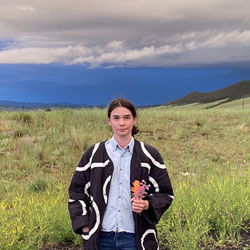 Alex Toy is a Maine writer and astrologer. She is a doctoral candidate at the University of Denver and is working on her first novel. She will be offering a 6-week class on writing and astrology this fall through Vocational Poetics.
Alex Toy is a Maine writer and astrologer. She is a doctoral candidate at the University of Denver and is working on her first novel. She will be offering a 6-week class on writing and astrology this fall through Vocational Poetics.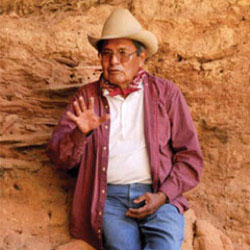 Harry Walters is a scholar, archaeologist, historian, Diné cultural consultant, teacher, and former director of the Diné College Historical Museum, which he held for 35 years before retiring in 2008. He attended the Institute of American Indian Arts, the Kansas City Art Institute, and the College of Santa Fe. Walters is from Cove, Arizona.
Harry Walters is a scholar, archaeologist, historian, Diné cultural consultant, teacher, and former director of the Diné College Historical Museum, which he held for 35 years before retiring in 2008. He attended the Institute of American Indian Arts, the Kansas City Art Institute, and the College of Santa Fe. Walters is from Cove, Arizona.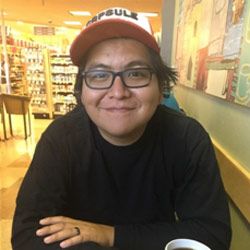 Damon Begay is Tótsohnii born for Naakai Dine’é; his maternal grandparents are the Naaneesht’ézhi Táchii’nii and his paternal grandparents are the Tsénjíkiní. Originally from Shiprock, New Mexico, he now resides in Phoenix, Arizona with his wife and cat. Begay grew up watching WB kids cartoons every Saturday morning, playing with Yu-Gi-Oh cards, and creating superhero comic universes with his friends under an imagined comic company they called Danger Comics, the real DC. As an independent comic artist, Begay continues to draw and post comics on his Instagram. He is currently experimenting with webcomics.
Damon Begay is Tótsohnii born for Naakai Dine’é; his maternal grandparents are the Naaneesht’ézhi Táchii’nii and his paternal grandparents are the Tsénjíkiní. Originally from Shiprock, New Mexico, he now resides in Phoenix, Arizona with his wife and cat. Begay grew up watching WB kids cartoons every Saturday morning, playing with Yu-Gi-Oh cards, and creating superhero comic universes with his friends under an imagined comic company they called Danger Comics, the real DC. As an independent comic artist, Begay continues to draw and post comics on his Instagram. He is currently experimenting with webcomics.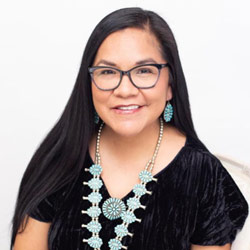 Jolyana Begay-Kroupa is Táchii’nii born for Tsinaajinii; her maternal grandparents are the Tł’ááshchí’í and her paternal grandparents are the Yée’ii Dine’é Táchii’nii. She is from Ts’iłdiilyesiitah (Rabbitbrush) near Fort Defiance, Arizona. She honorably served as the 50th Miss Navajo Nation (2001-2002). She currently resides in the Phoenix-Metro area where she is a Director of Development for Phoenix Indian Center specializing in language and culture revitalization and prevention programs. She has a Master of Arts in Social and Philosophical Foundations of Education with an emphasis in American Indian Education Policy and a Bachelor of Arts in Elementary Education with a Navajo language endorsement, both from Arizona State University. In addition to her work at Phoenix Indian Center, she currently teaches Navajo language classes at Arizona State University and Stanford University. She has also taught for Harvard University and Yale University. Language learning is her passion and she is an advocate on the importance of language revitalization. She is married and has three beautiful children.
Jolyana Begay-Kroupa is Táchii’nii born for Tsinaajinii; her maternal grandparents are the Tł’ááshchí’í and her paternal grandparents are the Yée’ii Dine’é Táchii’nii. She is from Ts’iłdiilyesiitah (Rabbitbrush) near Fort Defiance, Arizona. She honorably served as the 50th Miss Navajo Nation (2001-2002). She currently resides in the Phoenix-Metro area where she is a Director of Development for Phoenix Indian Center specializing in language and culture revitalization and prevention programs. She has a Master of Arts in Social and Philosophical Foundations of Education with an emphasis in American Indian Education Policy and a Bachelor of Arts in Elementary Education with a Navajo language endorsement, both from Arizona State University. In addition to her work at Phoenix Indian Center, she currently teaches Navajo language classes at Arizona State University and Stanford University. She has also taught for Harvard University and Yale University. Language learning is her passion and she is an advocate on the importance of language revitalization. She is married and has three beautiful children.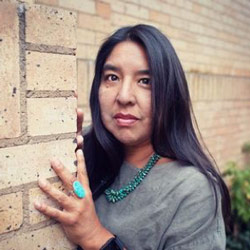 Esther Belin is Tł’ógí born for Tódích’íinii; her maternal grandparents are the Kin Łichíi’nii and her paternal grandparents are the Táchii’nii. She was born in Gallup, New Mexico, and raised in the Los Angeles area as part of the legacy following the U.S. Indian relocation policy. Belin has degrees from the University of California-Berkeley, the Institute of American Indian Arts, and Antioch University. Her 1999 poetry collection, From the Belly of My Beauty, won the American Book Award from the Before Columbus Foundation. Her second book, Of Cartography, was published in 2017. In addition to writing, Belin is a multimedia artist, and her art is featured on her two book covers.
Esther Belin is Tł’ógí born for Tódích’íinii; her maternal grandparents are the Kin Łichíi’nii and her paternal grandparents are the Táchii’nii. She was born in Gallup, New Mexico, and raised in the Los Angeles area as part of the legacy following the U.S. Indian relocation policy. Belin has degrees from the University of California-Berkeley, the Institute of American Indian Arts, and Antioch University. Her 1999 poetry collection, From the Belly of My Beauty, won the American Book Award from the Before Columbus Foundation. Her second book, Of Cartography, was published in 2017. In addition to writing, Belin is a multimedia artist, and her art is featured on her two book covers.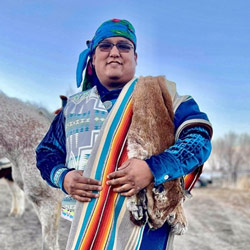 Kevin Belin is Tódích’íinii born for Tł’ógí; his maternal grandparents are the Ta’neeszhahnii and his paternal grandparents are the Chishí. He is director of the Diné Bizaad Institute, a Navajo language teacher at Navajo Preparatory School, an adjunct instructor with Diné College’s Navajo Cultural Arts Program and owner of Hashké – Hozhó Design and Collaborative. Belin has been in the education field for nearly a decade working with fellow teachers, consultants, and language instructors to perpetuate the Navajo language and culture through curriculum building, trainings, and presentations. Belin has been featured on Native America Calling, American Indian Republic, 21st Century Native Leaders podcast and Indian Country Today as a cultural representative and is a Billy Mill’s Running Strong Dreamstarter.
Kevin Belin is Tódích’íinii born for Tł’ógí; his maternal grandparents are the Ta’neeszhahnii and his paternal grandparents are the Chishí. He is director of the Diné Bizaad Institute, a Navajo language teacher at Navajo Preparatory School, an adjunct instructor with Diné College’s Navajo Cultural Arts Program and owner of Hashké – Hozhó Design and Collaborative. Belin has been in the education field for nearly a decade working with fellow teachers, consultants, and language instructors to perpetuate the Navajo language and culture through curriculum building, trainings, and presentations. Belin has been featured on Native America Calling, American Indian Republic, 21st Century Native Leaders podcast and Indian Country Today as a cultural representative and is a Billy Mill’s Running Strong Dreamstarter.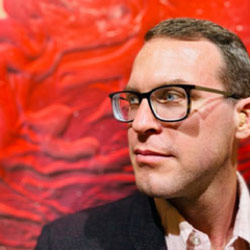 Will Cordeiro teaches creative writing workshops and interdisciplinary seminars for Northern Arizona University's Honors College. Will's work is published or forthcoming in AGNI, Bennington Review, Cimarron Review, The Cincinnati Review, Copper Nickel, The Threepenny Review, THRUSH, and elsewhere. Will’s collection Trap Street won the 2019 Able Muse Book Award. Will is also co-author of Experimental Writing: A Writers' Guide and Anthology, forthcoming from Bloomsbury. Will co-edits the small press Eggtooth Editions and is grateful for a grant from the Arizona Commission on the Arts. Will received an MFA and Ph.D. from Cornell University.
Will Cordeiro teaches creative writing workshops and interdisciplinary seminars for Northern Arizona University's Honors College. Will's work is published or forthcoming in AGNI, Bennington Review, Cimarron Review, The Cincinnati Review, Copper Nickel, The Threepenny Review, THRUSH, and elsewhere. Will’s collection Trap Street won the 2019 Able Muse Book Award. Will is also co-author of Experimental Writing: A Writers' Guide and Anthology, forthcoming from Bloomsbury. Will co-edits the small press Eggtooth Editions and is grateful for a grant from the Arizona Commission on the Arts. Will received an MFA and Ph.D. from Cornell University.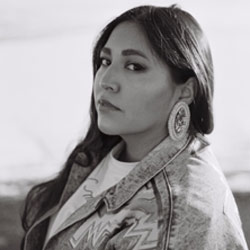 Stacie Denetsosie is Todích'íí'nii born for Naakaii Dine’é; her maternal grandparents are the Tł'ízí lání and her paternal step-grandparents are Bilagáana. She is from Kayenta, Arizona but currently resides in Logan, Utah. She works at Utah State University, where she holds two degrees: a B.S. in English with a Creative Writing Emphasis and M.A. in English and Literature Studies. Stacie recently graduated with her M.F.A in Fiction from the Institute of American Indian Arts. Stacie is a member of Saad Bee Hózhǫ́: Diné Writers’ Collective. Her work has appeared in Yellow Medicine Review, Phoebe Magazine, and Blossoms as the Cliffrose: Mormon Legacies and the Beckoning Wild via Torrey House Press. Stacie is at work on a short-story collection titled The Indigenous Odyssey.
Stacie Denetsosie is Todích'íí'nii born for Naakaii Dine’é; her maternal grandparents are the Tł'ízí lání and her paternal step-grandparents are Bilagáana. She is from Kayenta, Arizona but currently resides in Logan, Utah. She works at Utah State University, where she holds two degrees: a B.S. in English with a Creative Writing Emphasis and M.A. in English and Literature Studies. Stacie recently graduated with her M.F.A in Fiction from the Institute of American Indian Arts. Stacie is a member of Saad Bee Hózhǫ́: Diné Writers’ Collective. Her work has appeared in Yellow Medicine Review, Phoebe Magazine, and Blossoms as the Cliffrose: Mormon Legacies and the Beckoning Wild via Torrey House Press. Stacie is at work on a short-story collection titled The Indigenous Odyssey.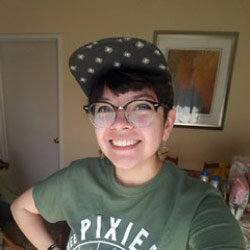 Julie Fiveash is Kinyaa’áanii born for Naakai Dine’é. Their maternal grandfather’s clan is Táchii’nii and their paternal grandfather’s clan is Bilagaana. Julie’s pronouns are they/them/theirs and they identify as non-binary. They are from Yuma, Arizona and currently reside in Los Angeles. They received their B.A. in Studio Art from Dartmouth College. Their experience in college creating zines and publishing comics in the college newspaper encouraged them to keep making comics and they moved to San Francisco shortly after graduating. There, they managed a comic book store while traveling to sell their work at zinefests and comic festivals. Their work has been featured in two Dirty Diamond comic collections and has been a featured artist on the “Baylies.” They’ve moderated panels at the Queer Comics Conference in 2019 and was recently featured in “Parsley, Sage, Rosemary, & Quarantine: Recipe Comics for Social Distancing.” They just finished their MLIS degree at UCLA’s Department of Information Studies and continues to make art and comics.
Julie Fiveash is Kinyaa’áanii born for Naakai Dine’é. Their maternal grandfather’s clan is Táchii’nii and their paternal grandfather’s clan is Bilagaana. Julie’s pronouns are they/them/theirs and they identify as non-binary. They are from Yuma, Arizona and currently reside in Los Angeles. They received their B.A. in Studio Art from Dartmouth College. Their experience in college creating zines and publishing comics in the college newspaper encouraged them to keep making comics and they moved to San Francisco shortly after graduating. There, they managed a comic book store while traveling to sell their work at zinefests and comic festivals. Their work has been featured in two Dirty Diamond comic collections and has been a featured artist on the “Baylies.” They’ve moderated panels at the Queer Comics Conference in 2019 and was recently featured in “Parsley, Sage, Rosemary, & Quarantine: Recipe Comics for Social Distancing.” They just finished their MLIS degree at UCLA’s Department of Information Studies and continues to make art and comics.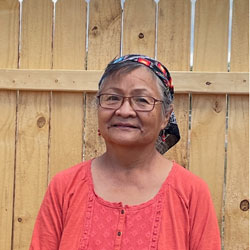 Nia Francisco is Tł’ááshchí’í born for ‘Áshįįhí; her maternal grandparents are the Kinyaa’áanii and her paternal grandparents are the Ta’neeszahnii. She has published two books of poetry: Blue Horses for Navajo Women (1988) and Carried Away by the Black River (1994). She has also co-edited with Anna Lee Walters “Navajo Traditional Knowledge” in The Sacred: Ways of Knowledge, Sources of Life (1977). Francisco has received a grant from the National Endowment for the Arts as well as recognition from the Arizona Commission on the Arts. She has taught at the Navajo Community College in Shiprock, New Mexico, served as an educator around the Navajo Nation, and worked in Tribal Family Services, Division of Social Services, for about twelve years.
Nia Francisco is Tł’ááshchí’í born for ‘Áshįįhí; her maternal grandparents are the Kinyaa’áanii and her paternal grandparents are the Ta’neeszahnii. She has published two books of poetry: Blue Horses for Navajo Women (1988) and Carried Away by the Black River (1994). She has also co-edited with Anna Lee Walters “Navajo Traditional Knowledge” in The Sacred: Ways of Knowledge, Sources of Life (1977). Francisco has received a grant from the National Endowment for the Arts as well as recognition from the Arizona Commission on the Arts. She has taught at the Navajo Community College in Shiprock, New Mexico, served as an educator around the Navajo Nation, and worked in Tribal Family Services, Division of Social Services, for about twelve years.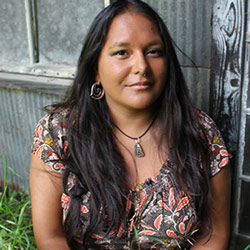 Danielle Geller is Tsi’naajinii, born for Bilagáana. Her first book, Dog Flowers, was published by One World/Penguin Random House in 2021. Winner of a 2016 Rona Jaffe Writers’ Award, her work has appeared in Guernica, The Paris Review Daily, The New Yorker, Brevity, and Arizona Highways. She teaches creative writing at the University of Victoria and is a faculty mentor for the Institute of American Indian Arts.
Danielle Geller is Tsi’naajinii, born for Bilagáana. Her first book, Dog Flowers, was published by One World/Penguin Random House in 2021. Winner of a 2016 Rona Jaffe Writers’ Award, her work has appeared in Guernica, The Paris Review Daily, The New Yorker, Brevity, and Arizona Highways. She teaches creative writing at the University of Victoria and is a faculty mentor for the Institute of American Indian Arts.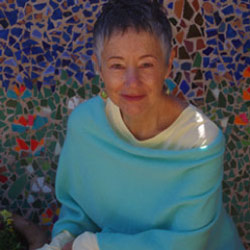 Veronica Golos is the author of four poetry collections: A Bell Buried Deep (Story Line Press, winner of the Nicholas Roerich Poetry Prize), Vocabular of Silence (Red Hen Press, winner of the New Mexico Book Award), Rootwork (3:A Taos Press), and Girl (Awarded the Naji Naaman Honor Prize for Poetry, Beirut, Lebanon). Golos is the founding co-editor of the Taos Journal of International Poetry & Art, former poetry editor for the Journal of Feminist Studies in Religion, faculty for the Tupelo Press Writers Conference, and Acquisitions Consultant for 3:A Taos Press. She lives in Taos, New Mexico with her husband, David Perez.
Veronica Golos is the author of four poetry collections: A Bell Buried Deep (Story Line Press, winner of the Nicholas Roerich Poetry Prize), Vocabular of Silence (Red Hen Press, winner of the New Mexico Book Award), Rootwork (3:A Taos Press), and Girl (Awarded the Naji Naaman Honor Prize for Poetry, Beirut, Lebanon). Golos is the founding co-editor of the Taos Journal of International Poetry & Art, former poetry editor for the Journal of Feminist Studies in Religion, faculty for the Tupelo Press Writers Conference, and Acquisitions Consultant for 3:A Taos Press. She lives in Taos, New Mexico with her husband, David Perez.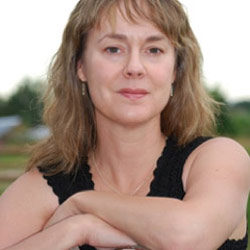 Stephanie G’Schwind is editor-in-chief of Colorado Review and director of The Center for Literary Publishing at Colorado State University. She is also editor of the nonfiction anthologies Man in the Moon: Essays on Fathers & Fatherhood and Beautiful Flesh: A Body of Essays.
Stephanie G’Schwind is editor-in-chief of Colorado Review and director of The Center for Literary Publishing at Colorado State University. She is also editor of the nonfiction anthologies Man in the Moon: Essays on Fathers & Fatherhood and Beautiful Flesh: A Body of Essays. Lawrence Lenhart studied writing at the University of Pittsburgh and holds an MFA from the University of Arizona. He is the author of the essay collections The Well-Stocked and Gilded Cage (Outpost19), Of No Ground (WVU), and Backvalley Ferrets: A Rewilding of the Colorado Plateau (Georgia). He is the co-author, with William Cordeiro, of Experimental Writing: A Writer's Guide and Anthology (Bloomsbury). He is Associate Chair and Associate Professor of English at Northern Arizona University, where he teaches fiction, nonfiction, literary editing and publishing, and climate science narratives in the MFA Program. Lenhart is editor-in-chief of Carbon Copy, reviews editor of DIAGRAM, and President of the Northern Arizona Book Festival.
Lawrence Lenhart studied writing at the University of Pittsburgh and holds an MFA from the University of Arizona. He is the author of the essay collections The Well-Stocked and Gilded Cage (Outpost19), Of No Ground (WVU), and Backvalley Ferrets: A Rewilding of the Colorado Plateau (Georgia). He is the co-author, with William Cordeiro, of Experimental Writing: A Writer's Guide and Anthology (Bloomsbury). He is Associate Chair and Associate Professor of English at Northern Arizona University, where he teaches fiction, nonfiction, literary editing and publishing, and climate science narratives in the MFA Program. Lenhart is editor-in-chief of Carbon Copy, reviews editor of DIAGRAM, and President of the Northern Arizona Book Festival.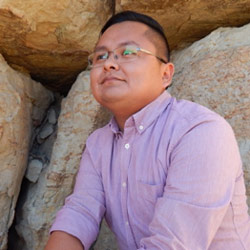 Manny Loley is ‘Áshįįhi born for Tó Baazhní’ázhí; his maternal grandparents are the Tódích’íi’nii and his paternal grandparents are the Kinyaa’áanii. Loley is from Casamero Lake, New Mexico. He holds an M.F.A. in fiction from the Institute of American Indian Arts and he is a current Ph.D. candidate in English and literary arts at the University of Denver. Loley is a member of Saad Bee Hózhǫ́: Diné Writers’ Collective and director of the Emerging Diné Writers’ Institute. He is also the program coordinator for Six Directions: Indigenous Creative Writing Program through Lighthouse Writers Workshop in Denver, CO. His work has found homes in the Massachusetts Review, the Santa Fe Literary Review, Broadsided Press, the Yellow Medicine Review, and the Diné Reader: an Anthology of Navajo Literature, among others. His writing has been nominated for Pushcart Prizes by Broadsided Press and the Santa Fe Literary Review. Loley is at work on a novel titled They Collect Rain in Their Palms.
Manny Loley is ‘Áshįįhi born for Tó Baazhní’ázhí; his maternal grandparents are the Tódích’íi’nii and his paternal grandparents are the Kinyaa’áanii. Loley is from Casamero Lake, New Mexico. He holds an M.F.A. in fiction from the Institute of American Indian Arts and he is a current Ph.D. candidate in English and literary arts at the University of Denver. Loley is a member of Saad Bee Hózhǫ́: Diné Writers’ Collective and director of the Emerging Diné Writers’ Institute. He is also the program coordinator for Six Directions: Indigenous Creative Writing Program through Lighthouse Writers Workshop in Denver, CO. His work has found homes in the Massachusetts Review, the Santa Fe Literary Review, Broadsided Press, the Yellow Medicine Review, and the Diné Reader: an Anthology of Navajo Literature, among others. His writing has been nominated for Pushcart Prizes by Broadsided Press and the Santa Fe Literary Review. Loley is at work on a novel titled They Collect Rain in Their Palms.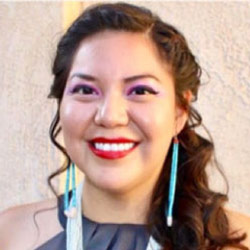 Amber McCrary is Kin Łichíi’nii born for Naakaii Dine’é; her maternal grandparents are the ‘Áshįįhi and her paternal grandparents are the Ta’neeszahnii. She is from Shonto, Arizona. McCrary is a Diné poet, zinester, and feminist. She holds an M.F.A. in poetry from Mills College in Oakland, California. McCrary is the author of the chapbook Electric Deserts (Tolsun Books). She is the 2020 EDWI Lead Author and the core faculty for poetry.
Amber McCrary is Kin Łichíi’nii born for Naakaii Dine’é; her maternal grandparents are the ‘Áshįįhi and her paternal grandparents are the Ta’neeszahnii. She is from Shonto, Arizona. McCrary is a Diné poet, zinester, and feminist. She holds an M.F.A. in poetry from Mills College in Oakland, California. McCrary is the author of the chapbook Electric Deserts (Tolsun Books). She is the 2020 EDWI Lead Author and the core faculty for poetry.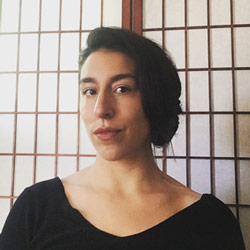 Jade McLellan (she/her) is the Poetry Editor for the Santa Fe Literary Review. A Santa Fe Community College alumna, Jade began as an intern with the Review in 2017 and has been an editor since 2018. She is currently a senior at the University of New Mexico in the departments of Biology and Sustainability Studies. When not playing TTRPGs or nerding out about cheese, Jade can be found deep in a book, preferably with tea and her cat close by.
Jade McLellan (she/her) is the Poetry Editor for the Santa Fe Literary Review. A Santa Fe Community College alumna, Jade began as an intern with the Review in 2017 and has been an editor since 2018. She is currently a senior at the University of New Mexico in the departments of Biology and Sustainability Studies. When not playing TTRPGs or nerding out about cheese, Jade can be found deep in a book, preferably with tea and her cat close by.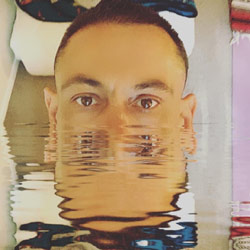 tanner menard is a poet & composer, a Louisiana Creole & a member of the Atakapa Ishak Nation. They have published ten albums of ambient music, a chapbook & have been three times nominated for a Pushcart Prize. In 2019, The Wire Magazine called their collaborative chapbook & album with Andrew Weathers an influential modern composition. They are an MFA Candidate at Northern Arizona University, an organizer for Equality Arizona & a Kundalini Yoga Instructor.
tanner menard is a poet & composer, a Louisiana Creole & a member of the Atakapa Ishak Nation. They have published ten albums of ambient music, a chapbook & have been three times nominated for a Pushcart Prize. In 2019, The Wire Magazine called their collaborative chapbook & album with Andrew Weathers an influential modern composition. They are an MFA Candidate at Northern Arizona University, an organizer for Equality Arizona & a Kundalini Yoga Instructor.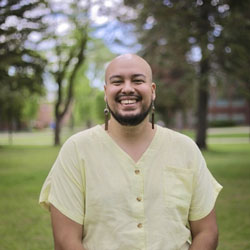 Jay Mercado (he/they) is a 2Spirit Piipaash and Quechan recording artist and poet, and an enrolled member of the Gila River Indian Community residing in Flagstaff, Arizona. In February 2021 they released their debut EP of recorded music entitled Dysphoria. Jay is a 2020 graduate of the MFA in Creative Writing from the Institute of American Indian Arts.
Jay Mercado (he/they) is a 2Spirit Piipaash and Quechan recording artist and poet, and an enrolled member of the Gila River Indian Community residing in Flagstaff, Arizona. In February 2021 they released their debut EP of recorded music entitled Dysphoria. Jay is a 2020 graduate of the MFA in Creative Writing from the Institute of American Indian Arts.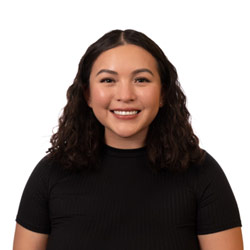 Chael Moore is Ts’ahyisk’idnii, born for Honagháanii, her maternal grandparents are To’ahaní, and her paternal grandparents are To’aheedliinii. She is an undergraduate student at Arizona State University studying Creative Writing with a focus in fiction. Her work is inspired by her identity as a contemporary Diné woman, Indigenous futures, Diné culture, and more. Moore’s work has been featured in ASUNow, Lux Creative Review, Turning Points Magazine, and is being exhibited at the Museum of Northern Arizona. She is originally from Crystal, NM on the Navajo Nation and currently resides on Akimel O’odham and Peeposh lands, also known as Tempe, AZ.
Chael Moore is Ts’ahyisk’idnii, born for Honagháanii, her maternal grandparents are To’ahaní, and her paternal grandparents are To’aheedliinii. She is an undergraduate student at Arizona State University studying Creative Writing with a focus in fiction. Her work is inspired by her identity as a contemporary Diné woman, Indigenous futures, Diné culture, and more. Moore’s work has been featured in ASUNow, Lux Creative Review, Turning Points Magazine, and is being exhibited at the Museum of Northern Arizona. She is originally from Crystal, NM on the Navajo Nation and currently resides on Akimel O’odham and Peeposh lands, also known as Tempe, AZ. Sean Sam is Bilagáana born for Tsi’naajínii. Naasht'ezhi Dine’é is his paternal grandparent’s clan. He holds a M.S. in Professional Writing from Towson University. He is an editor and founder of Ligeia Magazine, a literary website based out of Baltimore. His work has appeared or is forthcoming in The Malahat Review, The Westchester Review, Salt Hill, RED Ink, and Potomac Review, among other places. He currently resides in Maryland.
Sean Sam is Bilagáana born for Tsi’naajínii. Naasht'ezhi Dine’é is his paternal grandparent’s clan. He holds a M.S. in Professional Writing from Towson University. He is an editor and founder of Ligeia Magazine, a literary website based out of Baltimore. His work has appeared or is forthcoming in The Malahat Review, The Westchester Review, Salt Hill, RED Ink, and Potomac Review, among other places. He currently resides in Maryland.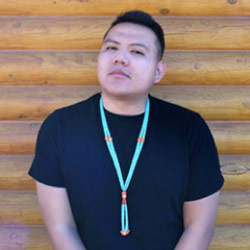 Jake Skeets is Tsi’naajínii born for Tábąąhá; his maternal grandparents are the Táchii’nii and his paternal grandparents are the Tódík’ózhí. Skeets is from Vanderwagen, New Mexico. He is the author of Eyes Bottle Dark with a Mouthful of Flowers, winner of the 2018 National Poetry Series. He holds an M.F.A. in poetry from the Institute of American Indian Arts. His honors include a 92Y Discovery Poetry Prize and 2020 Whiting Award. He is a member of Saad Bee Hózhǫ́: Diné Writers’ Collective. Skeets is an Assistant Professor and teaches at Diné College in Tsaile, Arizona.
Jake Skeets is Tsi’naajínii born for Tábąąhá; his maternal grandparents are the Táchii’nii and his paternal grandparents are the Tódík’ózhí. Skeets is from Vanderwagen, New Mexico. He is the author of Eyes Bottle Dark with a Mouthful of Flowers, winner of the 2018 National Poetry Series. He holds an M.F.A. in poetry from the Institute of American Indian Arts. His honors include a 92Y Discovery Poetry Prize and 2020 Whiting Award. He is a member of Saad Bee Hózhǫ́: Diné Writers’ Collective. Skeets is an Assistant Professor and teaches at Diné College in Tsaile, Arizona.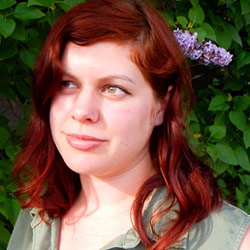 Jessica Tanck lives and writes in Salt Lake City, where she is a Vice Presidential Fellow and doctoral student in poetry at the University of Utah. Her writing has appeared or is forthcoming in Blackbird, Colorado Review, DIAGRAM, the Los Angeles Review, Meridian, New Ohio Review, and elsewhere.
Jessica Tanck lives and writes in Salt Lake City, where she is a Vice Presidential Fellow and doctoral student in poetry at the University of Utah. Her writing has appeared or is forthcoming in Blackbird, Colorado Review, DIAGRAM, the Los Angeles Review, Meridian, New Ohio Review, and elsewhere.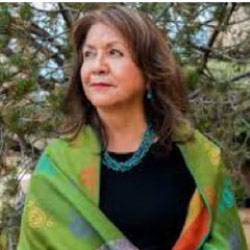 Dr. Laura Tohe is Tsénahabiłnii born for the Tódich’inii. She grew up at the base of the Chuska Mountains in Crystal, New Mexico. Dr. Tohe earned her B.A. from the University of New Mexico and her M.A. and Ph.D. in creative writing and literature from the University of Nebraska in Lincoln. Dr. Tohe is the author of Making Friends with Water; No Parole Today (named Poetry Book of the Year by the Wordcraft Circle of Native American Writers and Storytellers); Sister Nations: Native American Women Writers on Community, co-edited with Heid Erdrich; Tseyí Deep in the Rock, in collaboration with photographer, Stephen Strom (received the Arizona Book Association’s Glyph Award for Best Poetry and Best Book); and Code Talker Stories. The Phoenix Symphony commissioned her to write the libretto for “Enemy Slayer, A Navajo Oratorio,” which made its 2008 world premiere as part of the Phoenix Symphony’s 60th anniversary. A compact disc recording of “Enemy Slayer” is on the Naxos classical music label. It received rave reviews by the Arizona Republic and was called “a triumph” by Opera Today. Her other awards include the Dan Schilling Public Scholar Award by the Arizona Humanities. Dr. Tohe is professor emeritus for Arizona State University and she is the current Navajo Nation Poet Laureate. Dr. Tohe was also named a 2020 Poet Laureate Fellow by the Academy of American Poets.
Dr. Laura Tohe is Tsénahabiłnii born for the Tódich’inii. She grew up at the base of the Chuska Mountains in Crystal, New Mexico. Dr. Tohe earned her B.A. from the University of New Mexico and her M.A. and Ph.D. in creative writing and literature from the University of Nebraska in Lincoln. Dr. Tohe is the author of Making Friends with Water; No Parole Today (named Poetry Book of the Year by the Wordcraft Circle of Native American Writers and Storytellers); Sister Nations: Native American Women Writers on Community, co-edited with Heid Erdrich; Tseyí Deep in the Rock, in collaboration with photographer, Stephen Strom (received the Arizona Book Association’s Glyph Award for Best Poetry and Best Book); and Code Talker Stories. The Phoenix Symphony commissioned her to write the libretto for “Enemy Slayer, A Navajo Oratorio,” which made its 2008 world premiere as part of the Phoenix Symphony’s 60th anniversary. A compact disc recording of “Enemy Slayer” is on the Naxos classical music label. It received rave reviews by the Arizona Republic and was called “a triumph” by Opera Today. Her other awards include the Dan Schilling Public Scholar Award by the Arizona Humanities. Dr. Tohe is professor emeritus for Arizona State University and she is the current Navajo Nation Poet Laureate. Dr. Tohe was also named a 2020 Poet Laureate Fellow by the Academy of American Poets.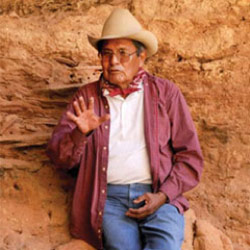 Harry Walters is a scholar, archaeologist, historian, Diné cultural consultant, teacher, and former director of the Diné College Historical Museum, which he held for 35 years before retiring in 2008. He attended the Institute of American Indian Arts, the Kansas City Art Institute, and the College of Santa Fe. Walters is from Cove, Arizona.
Harry Walters is a scholar, archaeologist, historian, Diné cultural consultant, teacher, and former director of the Diné College Historical Museum, which he held for 35 years before retiring in 2008. He attended the Institute of American Indian Arts, the Kansas City Art Institute, and the College of Santa Fe. Walters is from Cove, Arizona.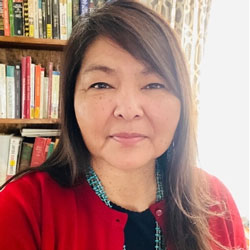 Dr. Jennifer Wheeler is Yoo’í Dine’é born for Kin Yaa’áanii; her maternal grandparents are the Kin Yaa’áani and her paternal grandparents are the Tó Dích’íí’nii. She is originally from Many Farms, Arizona, but resides in Window Rock with her family. Dr. Wheeler has been an educator of Navajo language, English, Humanities, and American Indian Studies for over twenty years. She earned her B.S. degree in Secondary Education with an emphasis in English and Navajo from Northern Arizona University, and both M.A. and Ph.D. in English from Arizona State University. She is Interim Dean of Graduate Studies at Navajo Technical University. Dr. Wheeler is a former Miss Navajo Nation 1990-91.
Dr. Jennifer Wheeler is Yoo’í Dine’é born for Kin Yaa’áanii; her maternal grandparents are the Kin Yaa’áani and her paternal grandparents are the Tó Dích’íí’nii. She is originally from Many Farms, Arizona, but resides in Window Rock with her family. Dr. Wheeler has been an educator of Navajo language, English, Humanities, and American Indian Studies for over twenty years. She earned her B.S. degree in Secondary Education with an emphasis in English and Navajo from Northern Arizona University, and both M.A. and Ph.D. in English from Arizona State University. She is Interim Dean of Graduate Studies at Navajo Technical University. Dr. Wheeler is a former Miss Navajo Nation 1990-91.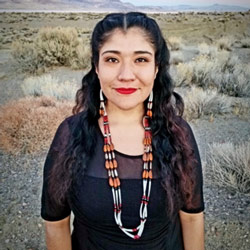 Tanaya Winder is an author, singer/songwriter, and motivational speaker who comes from an intertribal lineage of Southern Ute, Pyramid Lake Paiute, and Duckwater Shoshone Nations where she is an enrolled citizen. She is a 2016 National Center for American Indian Enterprise Development “40 Under 40” list of emerging American Indian leaders recipient. Winder co-founded
Tanaya Winder is an author, singer/songwriter, and motivational speaker who comes from an intertribal lineage of Southern Ute, Pyramid Lake Paiute, and Duckwater Shoshone Nations where she is an enrolled citizen. She is a 2016 National Center for American Indian Enterprise Development “40 Under 40” list of emerging American Indian leaders recipient. Winder co-founded 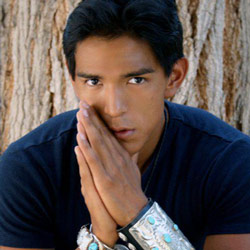 Brian Young is T’áchiinii born for Ta’neeszahnii; his maternal grandparents are the T’ódích’íinii and his paternal grandparents are the T’ódik’ǫzhi. He is from Tséhootsooí (Fort Defiance, AZ) and he currently lives in Brooklyn, NY. An author and filmmaker, Young is a graduate of both Yale University with a Bachelor’s in Film Studies and Columbia University with a Master’s in Creative Writing Fiction. An enrolled member of the Navajo Nation, he grew up on the Navajo Reservation but now currently lives in Brooklyn, New York. As an undergraduate, Brian won a fellowship with the prestigious Sundance Ford Foundation with one of his feature length scripts. He has worked on several short films including Tsídii Nááts’íílid – Rainbow Bird and A Conversation on Race with Native Americans for the short documentary series produced by the New York Times. Brian is currently working on his second book with Heartdrum, an imprint of HarperCollins.
Brian Young is T’áchiinii born for Ta’neeszahnii; his maternal grandparents are the T’ódích’íinii and his paternal grandparents are the T’ódik’ǫzhi. He is from Tséhootsooí (Fort Defiance, AZ) and he currently lives in Brooklyn, NY. An author and filmmaker, Young is a graduate of both Yale University with a Bachelor’s in Film Studies and Columbia University with a Master’s in Creative Writing Fiction. An enrolled member of the Navajo Nation, he grew up on the Navajo Reservation but now currently lives in Brooklyn, New York. As an undergraduate, Brian won a fellowship with the prestigious Sundance Ford Foundation with one of his feature length scripts. He has worked on several short films including Tsídii Nááts’íílid – Rainbow Bird and A Conversation on Race with Native Americans for the short documentary series produced by the New York Times. Brian is currently working on his second book with Heartdrum, an imprint of HarperCollins.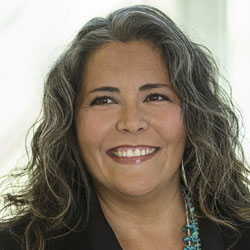 Rowena Alegría is Chief Storyteller for the City & County of Denver, founder and director of I Am Denver, a citywide storytelling and cultural preservation project. A 2019 Jack Jones Literary Arts Fellow, 2019 Vermont Studio Center Fellow and 2018 Writing by Writers Fellow, Alegría earned an MFA from the Institute of American Indian Arts and is a member of Sandra Cisneros’ Macondo Writers Workshop. Her fiction and creative nonfiction have appeared in The Rumpus, the Mississippi Review, Tribal College Journal and elsewhere. A career journalist, communications executive and speech writer, she is writing a novel that plays with form and the history of the Southwest. For more, see
Rowena Alegría is Chief Storyteller for the City & County of Denver, founder and director of I Am Denver, a citywide storytelling and cultural preservation project. A 2019 Jack Jones Literary Arts Fellow, 2019 Vermont Studio Center Fellow and 2018 Writing by Writers Fellow, Alegría earned an MFA from the Institute of American Indian Arts and is a member of Sandra Cisneros’ Macondo Writers Workshop. Her fiction and creative nonfiction have appeared in The Rumpus, the Mississippi Review, Tribal College Journal and elsewhere. A career journalist, communications executive and speech writer, she is writing a novel that plays with form and the history of the Southwest. For more, see 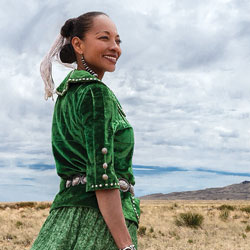 Radmilla Cody is Tł’áá'shchí'í born for Naahiłí (African Americans). Cody holds a Bachelors of Science in public relations with a minor in sociology. She is a Grammy nominee, multiple Native American Music Awards winner, 46th Miss Navajo, one of NPR’s 50 Great Voices, a Black History Maker honoree, and an advocate against domestic abuse and violence. Cody is the subject of an award-winning documentary titled “Hearing Radmilla” produced and directed by Angela Webb, which further explores Radmilla’s journey as an activist and international performer. Cody has released multiple award-winning albums including Within the Four Directions, Seed of Life, Spirit of a Woman, Shi Keyah, and many more. For more information or to contact her, see www.radmillacody.com.
Radmilla Cody is Tł’áá'shchí'í born for Naahiłí (African Americans). Cody holds a Bachelors of Science in public relations with a minor in sociology. She is a Grammy nominee, multiple Native American Music Awards winner, 46th Miss Navajo, one of NPR’s 50 Great Voices, a Black History Maker honoree, and an advocate against domestic abuse and violence. Cody is the subject of an award-winning documentary titled “Hearing Radmilla” produced and directed by Angela Webb, which further explores Radmilla’s journey as an activist and international performer. Cody has released multiple award-winning albums including Within the Four Directions, Seed of Life, Spirit of a Woman, Shi Keyah, and many more. For more information or to contact her, see www.radmillacody.com. Will Cordeiro lives in Flagstaff and teaches creative writing workshops and interdisciplinary seminars for Northern Arizona University's Honors College. Will's work is published or forthcoming in Agni, Best New Poets, Cimarron Review, The Cincinnati Review, Copper Nickel, Nashville Review, Poetry Northwest, Sycamore Review, Tinderbox Poetry Journal, The Threepenny Review, and elsewhere. Will’s collection Trap Street won the 2019 Able Muse Book Award. Will co-edits the small press Eggtooth Editions and is grateful for a grant from the Arizona Commission on the Arts. Will received an MFA and Ph.D. from Cornell University.
Will Cordeiro lives in Flagstaff and teaches creative writing workshops and interdisciplinary seminars for Northern Arizona University's Honors College. Will's work is published or forthcoming in Agni, Best New Poets, Cimarron Review, The Cincinnati Review, Copper Nickel, Nashville Review, Poetry Northwest, Sycamore Review, Tinderbox Poetry Journal, The Threepenny Review, and elsewhere. Will’s collection Trap Street won the 2019 Able Muse Book Award. Will co-edits the small press Eggtooth Editions and is grateful for a grant from the Arizona Commission on the Arts. Will received an MFA and Ph.D. from Cornell University.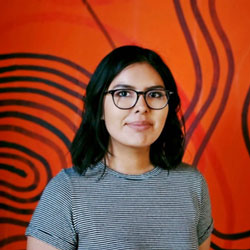 Sierra Edd is a Diné poet and artist who grew up in Durango, Colorado / Four Corners. She is Tł'ógi born for Kinłichii'nii. In her work, she highlights the experiences of Native women, incorporating themes of spirituality, trauma, healing, and Indigenous futures. Her poetry has been included in the AsUs online journal, Red House Wanderings art book student publication, and the Anthology of Emerging Poets from Z Publishing House. She is currently a doctoral student in Ethnic Studies at the University of California, Berkeley.
Sierra Edd is a Diné poet and artist who grew up in Durango, Colorado / Four Corners. She is Tł'ógi born for Kinłichii'nii. In her work, she highlights the experiences of Native women, incorporating themes of spirituality, trauma, healing, and Indigenous futures. Her poetry has been included in the AsUs online journal, Red House Wanderings art book student publication, and the Anthology of Emerging Poets from Z Publishing House. She is currently a doctoral student in Ethnic Studies at the University of California, Berkeley. Julie Fiveash is Kinyaa’áanii born for Naakai Dine’é; their maternal grandfather’s clan is Táchii’nii and their paternal grandfather’s clan is Bilagáana. Julie’s pronouns are they/them/theirs and they identify as non-binary. They are from Yuma, Arizona and currently live in Los Angeles, California. They received their B.A. in Studio Art from Dartmouth College. Their experience in college creating zines and publishing comics in the school newspaper encouraged them to keep making comics and they moved to San Francisco shortly after graduating. They managed a comic book store for three years while traveling to sell their work at zinefest and comic festivals all around the U.S. Their work has been featured in two Dirty Diamond comic collections and has been a featured artist on the “Baylies.” They’ve moderated panels at the Queer Comics Conference and has co-edited a fanzine that raised $3000 for non-profit organizations. They are currently pursuing their MLIS degree at UCLA’s Department of Information Studies and continues to make comics, being recently featured in “Parsley, Sage, Rosemary, & Quarantine: Recipe Comics for Social Distancing.”
Julie Fiveash is Kinyaa’áanii born for Naakai Dine’é; their maternal grandfather’s clan is Táchii’nii and their paternal grandfather’s clan is Bilagáana. Julie’s pronouns are they/them/theirs and they identify as non-binary. They are from Yuma, Arizona and currently live in Los Angeles, California. They received their B.A. in Studio Art from Dartmouth College. Their experience in college creating zines and publishing comics in the school newspaper encouraged them to keep making comics and they moved to San Francisco shortly after graduating. They managed a comic book store for three years while traveling to sell their work at zinefest and comic festivals all around the U.S. Their work has been featured in two Dirty Diamond comic collections and has been a featured artist on the “Baylies.” They’ve moderated panels at the Queer Comics Conference and has co-edited a fanzine that raised $3000 for non-profit organizations. They are currently pursuing their MLIS degree at UCLA’s Department of Information Studies and continues to make comics, being recently featured in “Parsley, Sage, Rosemary, & Quarantine: Recipe Comics for Social Distancing.” Veronica Golos is the author of four poetry collections: A Bell Buried Deep (Story Line Press, winner of the Nicholas Roerich Poetry Prize), Vocabular of Silence (Red Hen Press, winner of the New Mexico Book Award), Rootwork (3:A Taos Press), and Girl (Awarded the Naji Naaman Honor Prize for Poetry, Beirut, Lebanon). Golos is the founding co-editor of the Taos Journal of International Poetry & Art, former poetry editor for the Journal of Feminist Studies in Religion, faculty for the Tupelo Press Writers Conference, and Acquisitions Consultant for 3:A Taos Press. She lives in Taos, New Mexico with her husband, David Perez.
Veronica Golos is the author of four poetry collections: A Bell Buried Deep (Story Line Press, winner of the Nicholas Roerich Poetry Prize), Vocabular of Silence (Red Hen Press, winner of the New Mexico Book Award), Rootwork (3:A Taos Press), and Girl (Awarded the Naji Naaman Honor Prize for Poetry, Beirut, Lebanon). Golos is the founding co-editor of the Taos Journal of International Poetry & Art, former poetry editor for the Journal of Feminist Studies in Religion, faculty for the Tupelo Press Writers Conference, and Acquisitions Consultant for 3:A Taos Press. She lives in Taos, New Mexico with her husband, David Perez. Stephanie G’Schwind is editor-in-chief of Colorado Review and director of The Center for Literary Publishing at Colorado State University. She is also editor of the nonfiction anthologies Man in the Moon: Essays on Fathers & Fatherhood and Beautiful Flesh: A Body of Essays.
Stephanie G’Schwind is editor-in-chief of Colorado Review and director of The Center for Literary Publishing at Colorado State University. She is also editor of the nonfiction anthologies Man in the Moon: Essays on Fathers & Fatherhood and Beautiful Flesh: A Body of Essays.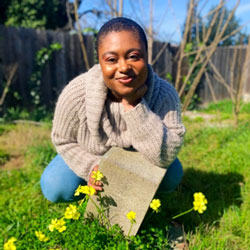 Raihana Jacqueline Haynes-Venerable is an artist, a photographer, a poet, and a scholar. She received her B.A. in Critical Theory and Social Justice at Occidental College in Los Angeles, CA and her MFA in Poetry at Mills College in Oakland, CA. Her love of black and white photography began during her four years of high school and has continued to fuel and enhance her written work. Her photograph "Fathers and Sons" can be found in the 2018 Winter issue of
Raihana Jacqueline Haynes-Venerable is an artist, a photographer, a poet, and a scholar. She received her B.A. in Critical Theory and Social Justice at Occidental College in Los Angeles, CA and her MFA in Poetry at Mills College in Oakland, CA. Her love of black and white photography began during her four years of high school and has continued to fuel and enhance her written work. Her photograph "Fathers and Sons" can be found in the 2018 Winter issue of  Jules Hogan is fiction editor with Hayden's Ferry Review and a fiction candidate at Arizona State University. Their work can be found in The Sonora Review, Appalachian Heritage, and Yalobusha Review. When not in Phoenix, Hogan enjoys hiking and bird watching in the blue ridge mountains.
Jules Hogan is fiction editor with Hayden's Ferry Review and a fiction candidate at Arizona State University. Their work can be found in The Sonora Review, Appalachian Heritage, and Yalobusha Review. When not in Phoenix, Hogan enjoys hiking and bird watching in the blue ridge mountains.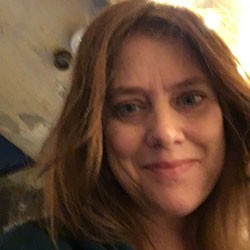 Joanna Howard is a writer and translator from Miami, Oklahoma. She is the author of the memoir Rerun Era (McSweeney’s, 2019), the novel Foreign Correspondent (Counterpath, 2013), a story collection On the Winding Stair (Boa editions, 2009), and In the Colorless Round a prose collaboration with artist Rikki Ducornet (Noemi, 2006). She co-wrote Field Glass, a speculative novel, with Joanna Ruocco (Sidebrow, 2017). Her work has appeared in Conjunctions, Paris Review, Verse, Bomb, Chicago Review, Brooklyn Rail, and parts elsewhere. She lives in Denver and Providence and teaches at University of Denver.
Joanna Howard is a writer and translator from Miami, Oklahoma. She is the author of the memoir Rerun Era (McSweeney’s, 2019), the novel Foreign Correspondent (Counterpath, 2013), a story collection On the Winding Stair (Boa editions, 2009), and In the Colorless Round a prose collaboration with artist Rikki Ducornet (Noemi, 2006). She co-wrote Field Glass, a speculative novel, with Joanna Ruocco (Sidebrow, 2017). Her work has appeared in Conjunctions, Paris Review, Verse, Bomb, Chicago Review, Brooklyn Rail, and parts elsewhere. She lives in Denver and Providence and teaches at University of Denver.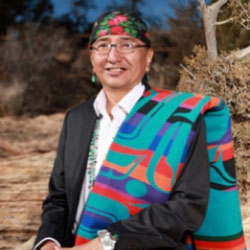 Rex Lee Jim is Kin Łichíi’nii born for Táchii’nii; his maternal grandparents are the Kinyaa’áanii and his paternal grandparents are the Naakaii Dine’é. Jim is from Rock Point, Arizona. A poet, playwright, and medicine man, Jim attended Princeton University, Middlebury Bread Loaf School of English, and Oxford University in England. He is fluent in Navajo, English, and Spanish. Although known mostly for his political career as former Navajo Nation Vice-President, Jim has extensive experience as a writer. He is an accomplished poet and has written three collections of poetry including: Saad Lá Tah Hozhóon (2019), which is a reprint of Jim’s trilingual collection of poetry titled Duchas Taa Koo Diné: a trilingual poetry collection in Navajo, Irish, and English (1998); Saad (1995); and Áhí Ni’Nikisheegiizh (1989). Jim continues to reside in his home community of Rock Point and he currently works at Diné College in Tsaile, Arizona.
Rex Lee Jim is Kin Łichíi’nii born for Táchii’nii; his maternal grandparents are the Kinyaa’áanii and his paternal grandparents are the Naakaii Dine’é. Jim is from Rock Point, Arizona. A poet, playwright, and medicine man, Jim attended Princeton University, Middlebury Bread Loaf School of English, and Oxford University in England. He is fluent in Navajo, English, and Spanish. Although known mostly for his political career as former Navajo Nation Vice-President, Jim has extensive experience as a writer. He is an accomplished poet and has written three collections of poetry including: Saad Lá Tah Hozhóon (2019), which is a reprint of Jim’s trilingual collection of poetry titled Duchas Taa Koo Diné: a trilingual poetry collection in Navajo, Irish, and English (1998); Saad (1995); and Áhí Ni’Nikisheegiizh (1989). Jim continues to reside in his home community of Rock Point and he currently works at Diné College in Tsaile, Arizona. Lawrence Lenhart is the author of The Well-Stocked and Gilded Cage (Outpost 19). His prose appears in publications like the Alaska Quarterly Review, Fourth Genre, Guernica, Gulf Coast, Passages North, Prairie Schooner, Western Humanities Review, and elsewhere. He teaches fiction and creative nonfiction at Northern Arizona University. Lenhart is an editor at DIAGRAM and a frequent writer for The Rumpus and Brazos Bookstore. He holds an M.F.A. from the University of Arizona.
Lawrence Lenhart is the author of The Well-Stocked and Gilded Cage (Outpost 19). His prose appears in publications like the Alaska Quarterly Review, Fourth Genre, Guernica, Gulf Coast, Passages North, Prairie Schooner, Western Humanities Review, and elsewhere. He teaches fiction and creative nonfiction at Northern Arizona University. Lenhart is an editor at DIAGRAM and a frequent writer for The Rumpus and Brazos Bookstore. He holds an M.F.A. from the University of Arizona. Manny Loley is ‘Áshįįhi born for Tó Baazhní’ázhí; his maternal grandparents are the Tódích’íi’nii and his paternal grandparents are the Kinyaa’áanii. Loley is from Casamero Lake, New Mexico. He holds an M.F.A. in fiction from the Institute of American Indian Arts and he is a current Ph.D. candidate in English and literary arts at the University of Denver. Loley is a member of Saad Bee Hózhǫ́: Diné Writers’ Collective and director of the Emerging Diné Writers’ Institute. His work has appeared in HIKA, Pollentongue: An Indigenous Poetry Salon and Reading, RED INK, the Santa Fe Literary Review, and is forthcoming in Diné Reader: an Anthology of Navajo Literature. His short story “Na’nízhoozhi Di” was nominated for a Pushcart Prize by the Santa Fe Literary Review in 2019. Loley is at work on a novel titled They Collect Rain in Their Palms.
Manny Loley is ‘Áshįįhi born for Tó Baazhní’ázhí; his maternal grandparents are the Tódích’íi’nii and his paternal grandparents are the Kinyaa’áanii. Loley is from Casamero Lake, New Mexico. He holds an M.F.A. in fiction from the Institute of American Indian Arts and he is a current Ph.D. candidate in English and literary arts at the University of Denver. Loley is a member of Saad Bee Hózhǫ́: Diné Writers’ Collective and director of the Emerging Diné Writers’ Institute. His work has appeared in HIKA, Pollentongue: An Indigenous Poetry Salon and Reading, RED INK, the Santa Fe Literary Review, and is forthcoming in Diné Reader: an Anthology of Navajo Literature. His short story “Na’nízhoozhi Di” was nominated for a Pushcart Prize by the Santa Fe Literary Review in 2019. Loley is at work on a novel titled They Collect Rain in Their Palms.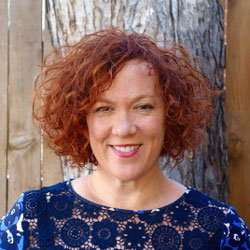 Joanna Luloff is co-editor of Copper Nickel and Associate Professor of English and creative writing at the University of Colorado Denver. She is the author of two books—the novel Remind Me Again What Happened (Algonquin, 2018) and the story collection The Beach at Galle Road (2012), which was chosen as a Discover Great New Writers Barnes & Noble selection and won the Maria Thomas Fiction Award. She has received residency fellowships from Ragdale, Willapa Bay AiR, and Virginia Center for the Creative Arts, and her work has appeared in Hawaii Pacific Review, Locomotive Magazine, The Missouri Review, Western Humanities Review, and elsewhere.
Joanna Luloff is co-editor of Copper Nickel and Associate Professor of English and creative writing at the University of Colorado Denver. She is the author of two books—the novel Remind Me Again What Happened (Algonquin, 2018) and the story collection The Beach at Galle Road (2012), which was chosen as a Discover Great New Writers Barnes & Noble selection and won the Maria Thomas Fiction Award. She has received residency fellowships from Ragdale, Willapa Bay AiR, and Virginia Center for the Creative Arts, and her work has appeared in Hawaii Pacific Review, Locomotive Magazine, The Missouri Review, Western Humanities Review, and elsewhere. Kristian Macaron is a Latinx/Lebanese writer from Albuquerque, NM. She attended the University of New Mexico for undergraduate studies and graduated from Emerson College in Boston, MA with an MFA in Fiction in 2012. She is currently an English instructor at the University of New Mexico Valencia Branch Campus and a Faculty Coordinator and volunteer course developer for the University of the People. Kristian’s poetry chapbook collection titled Storm was released in 2015 by Swimming with Elephants Publications. She has presented her work at various readings including Chatter Albuquerque, ABQ Slams, KUNM, and the Pen & Poet podcast. Other writing publications can be found in The Winter Tangerine Review, Ginosko Literary Journal, The Mantle Poetry, Luna Luna Magazine, Gargoyle Magazine, Drunk Monkey’s Magazine, Red Planet Magazine and forthcoming in Asimov’s Science Fiction, Gyroscope Review, & others. She is a co-founding editor of the NM-based literary journal, Manzano Mountain Review, which she began with co-editor Justin Bendell in 2017. View her work at Kristianmacaron.com
Kristian Macaron is a Latinx/Lebanese writer from Albuquerque, NM. She attended the University of New Mexico for undergraduate studies and graduated from Emerson College in Boston, MA with an MFA in Fiction in 2012. She is currently an English instructor at the University of New Mexico Valencia Branch Campus and a Faculty Coordinator and volunteer course developer for the University of the People. Kristian’s poetry chapbook collection titled Storm was released in 2015 by Swimming with Elephants Publications. She has presented her work at various readings including Chatter Albuquerque, ABQ Slams, KUNM, and the Pen & Poet podcast. Other writing publications can be found in The Winter Tangerine Review, Ginosko Literary Journal, The Mantle Poetry, Luna Luna Magazine, Gargoyle Magazine, Drunk Monkey’s Magazine, Red Planet Magazine and forthcoming in Asimov’s Science Fiction, Gyroscope Review, & others. She is a co-founding editor of the NM-based literary journal, Manzano Mountain Review, which she began with co-editor Justin Bendell in 2017. View her work at Kristianmacaron.com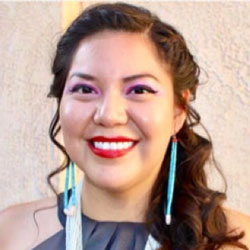 Amber McCrary is Kin Łichíi’nii born for Naakaii Dine’é; her maternal grandparents are the ‘Áshįįhi and her paternal grandparents are the Ta’neeszahnii. She is from Shonto, Arizona. McCrary is a Diné poet, zinester, and feminist. She holds an M.F.A. in poetry from Mills College in Oakland, California. McCrary is the author of the chapbook Electric Deserts (Tolsun Books). She is the 2020 EDWI Lead Author and the core faculty for poetry.
Amber McCrary is Kin Łichíi’nii born for Naakaii Dine’é; her maternal grandparents are the ‘Áshįįhi and her paternal grandparents are the Ta’neeszahnii. She is from Shonto, Arizona. McCrary is a Diné poet, zinester, and feminist. She holds an M.F.A. in poetry from Mills College in Oakland, California. McCrary is the author of the chapbook Electric Deserts (Tolsun Books). She is the 2020 EDWI Lead Author and the core faculty for poetry.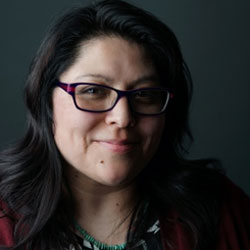 Natanya Ann Pulley is born to Kinyaa’áani. She’s published in Waxwing, Split Lip Magazine, As/Us, and The Offing (among others). Natanya is the founding editor of Hairstreak Butterfly Review and teaches texts by Native American writers, Fiction Writing, and Experimental Forms at Colorado College. Her debut story collection With Teeth was published by New Rivers Press (Oct. 2019) and her writing can be found at
Natanya Ann Pulley is born to Kinyaa’áani. She’s published in Waxwing, Split Lip Magazine, As/Us, and The Offing (among others). Natanya is the founding editor of Hairstreak Butterfly Review and teaches texts by Native American writers, Fiction Writing, and Experimental Forms at Colorado College. Her debut story collection With Teeth was published by New Rivers Press (Oct. 2019) and her writing can be found at 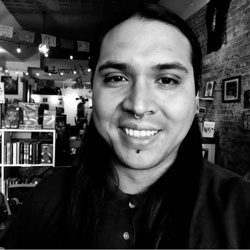 Adrian T. Quintanar is from Pomona, California and received an MFA in Poetry from the Institute of American Indian Arts, and his BA from Hampshire College. He is the managing editor of Chapter House Journal (formerly known as Mud City Journal). His work has appeared in RED INK Journal, Santa Ana River Review, and is forthcoming in Peripheries: a journal of word and image, Kweli Journal and Hinchas de Poesia.
Adrian T. Quintanar is from Pomona, California and received an MFA in Poetry from the Institute of American Indian Arts, and his BA from Hampshire College. He is the managing editor of Chapter House Journal (formerly known as Mud City Journal). His work has appeared in RED INK Journal, Santa Ana River Review, and is forthcoming in Peripheries: a journal of word and image, Kweli Journal and Hinchas de Poesia.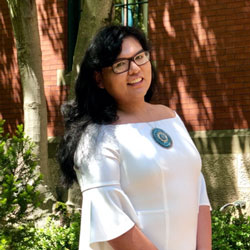 Charlie Amáyá Scott is a Diné scholar born and raised within the central part of the Navajo Nation. They are Naasht’ézhí Tábaahá born for Tsénjíkiní; their maternal grandparents are the Áshįįhí and their paternal grandparents are the Kiis’áanii. Charlie reflects, analyzes, and critiques what it means to be Queer, Trans, and Diné in the 21st century on their personal blog,
Charlie Amáyá Scott is a Diné scholar born and raised within the central part of the Navajo Nation. They are Naasht’ézhí Tábaahá born for Tsénjíkiní; their maternal grandparents are the Áshįįhí and their paternal grandparents are the Kiis’áanii. Charlie reflects, analyzes, and critiques what it means to be Queer, Trans, and Diné in the 21st century on their personal blog, 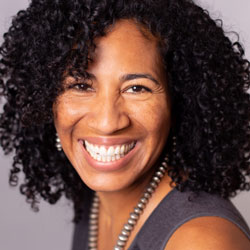 Mona Scott-Figueroa is Táchii’nii born for Naahiłí (African Americans); her maternal grandfather is ‘Áshįįhi and her paternal grandfather is Naahiłí. She is from Birdsprings on the Navajo Nation. Her maternal grandparents are Louise Curley and the late Harris Curley. Mona earned her doctorate in Educational Leadership and Innovation with an emphasis in American Indian Studies from ASU. Her dissertation focused on strategies for retaining Native students at Mesa Community College (MCC) where she has taught American Indian Studies and Sociology since 1999. She earned her MA in Sociology from ASU and her BA in Sociology from the University of Southern California. She also mentors high school students in a high school to college bridge program. Her teaching and research background include Indigenous epistemologies; inequalities and power with an emphasis on race and ethnicity. She draws heavily from life experiences growing up in South Central Los Angeles, in Birdsprings, and in Winslow, Arizona.
Mona Scott-Figueroa is Táchii’nii born for Naahiłí (African Americans); her maternal grandfather is ‘Áshįįhi and her paternal grandfather is Naahiłí. She is from Birdsprings on the Navajo Nation. Her maternal grandparents are Louise Curley and the late Harris Curley. Mona earned her doctorate in Educational Leadership and Innovation with an emphasis in American Indian Studies from ASU. Her dissertation focused on strategies for retaining Native students at Mesa Community College (MCC) where she has taught American Indian Studies and Sociology since 1999. She earned her MA in Sociology from ASU and her BA in Sociology from the University of Southern California. She also mentors high school students in a high school to college bridge program. Her teaching and research background include Indigenous epistemologies; inequalities and power with an emphasis on race and ethnicity. She draws heavily from life experiences growing up in South Central Los Angeles, in Birdsprings, and in Winslow, Arizona.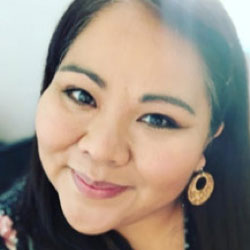 Roanna Shebala is Tsénjíkíní born for Deeshchíí’nii; her maternal grandparents are the Tótsohnii and her paternal grandparents are the Naasht’ézhi Dine’é. She is from Fort Defiance, Arizona. Shebala earned her B.S. in theater at Northern Arizona University and is a current M.F.A. in creative writing student at the Institute of American Indian Arts in Santa Fe, New Mexico. She is a spoken word artist who has been featured on four National Poetry Slam teams, five-time representative on the Women of the World Poetry Slam team, and a two-time representative for the Individual of the World Poetry Slam. Her work has been featured in Button Poetry, Indian Country Today, in various zines, and magazines such as Annick Press, Red Ink, Wicked Banshee Press, and Suspect Press. Shebala has performed her spoken word poetry at the Lincoln Center for the Out of Doors Project and nationally. She credits her father for gifting her with storytelling; her work combines story, poetry, and performance. She is also a member of Saad Bee Hózhǫ́: Diné Writers’ Collective.
Roanna Shebala is Tsénjíkíní born for Deeshchíí’nii; her maternal grandparents are the Tótsohnii and her paternal grandparents are the Naasht’ézhi Dine’é. She is from Fort Defiance, Arizona. Shebala earned her B.S. in theater at Northern Arizona University and is a current M.F.A. in creative writing student at the Institute of American Indian Arts in Santa Fe, New Mexico. She is a spoken word artist who has been featured on four National Poetry Slam teams, five-time representative on the Women of the World Poetry Slam team, and a two-time representative for the Individual of the World Poetry Slam. Her work has been featured in Button Poetry, Indian Country Today, in various zines, and magazines such as Annick Press, Red Ink, Wicked Banshee Press, and Suspect Press. Shebala has performed her spoken word poetry at the Lincoln Center for the Out of Doors Project and nationally. She credits her father for gifting her with storytelling; her work combines story, poetry, and performance. She is also a member of Saad Bee Hózhǫ́: Diné Writers’ Collective. Jake Skeets is Tsi’naajínii born for Tábąąhá; his maternal grandparents are the Táchii’nii and his paternal grandparents are the Tódík’ózhí. Skeets is from Vanderwagen, New Mexico. He is the author of Eyes Bottle Dark with a Mouthful of Flowers, winner of the 2018 National Poetry Series. He holds an M.F.A. in poetry from the Institute of American Indian Arts. His honors include a 92Y Discovery Poetry Prize and 2020 Whiting Award. He is a member of Saad Bee Hózhǫ́: Diné Writers’ Collective. Skeets is an Assistant Professor and teaches at Diné College in Tsaile, Arizona.
Jake Skeets is Tsi’naajínii born for Tábąąhá; his maternal grandparents are the Táchii’nii and his paternal grandparents are the Tódík’ózhí. Skeets is from Vanderwagen, New Mexico. He is the author of Eyes Bottle Dark with a Mouthful of Flowers, winner of the 2018 National Poetry Series. He holds an M.F.A. in poetry from the Institute of American Indian Arts. His honors include a 92Y Discovery Poetry Prize and 2020 Whiting Award. He is a member of Saad Bee Hózhǫ́: Diné Writers’ Collective. Skeets is an Assistant Professor and teaches at Diné College in Tsaile, Arizona. Mimi Tempestt is a daughter of California. She is an artist, writer, and academic whose works are aimed at disrupting negative and stereotypical narratives around the iconography and constructions of black and queer people. She is the 2019 winner of the Mary Merritt Henry Prize for a group of poems, and her debut book of poetry, The Monumental Misrememberings, is scheduled to be published with Co-conspirator Press in the Fall of 2020.
Mimi Tempestt is a daughter of California. She is an artist, writer, and academic whose works are aimed at disrupting negative and stereotypical narratives around the iconography and constructions of black and queer people. She is the 2019 winner of the Mary Merritt Henry Prize for a group of poems, and her debut book of poetry, The Monumental Misrememberings, is scheduled to be published with Co-conspirator Press in the Fall of 2020. Dr. Laura Tohe is Tsénahabiłnii born for the Tódich’inii. She grew up at the base of the Chuska Mountains in Crystal, New Mexico. Dr. Tohe earned her B.A. from the University of New Mexico and her M.A. and Ph.D. in creative writing and literature from the University of Nebraska in Lincoln. Dr. Tohe is the author of Making Friends with Water; No Parole Today (named Poetry Book of the Year by the Wordcraft Circle of Native American Writers and Storytellers); Sister Nations: Native American Women Writers on Community, co-edited with Heid Erdrich; Tseyí Deep in the Rock, in collaboration with photographer, Stephen Strom (received the Arizona Book Association’s Glyph Award for Best Poetry and Best Book); and Code Talker Stories. The Phoenix Symphony commissioned her to write the libretto for “Enemy Slayer, A Navajo Oratorio,” which made its 2008 world premiere as part of the Phoenix Symphony’s 60th anniversary. A compact disc recording of “Enemy Slayer” is on the Naxos classical music label. It received rave reviews by the Arizona Republic and was called “a triumph” by Opera Today. Her other awards include the Dan Schilling Public Scholar Award by the Arizona Humanities. Dr. Tohe is professor emeritus for Arizona State University and she is the current Navajo Nation Poet Laureate. Dr. Tohe was also named a 2020 Poet Laureate Fellow by the Academy of American Poets.
Dr. Laura Tohe is Tsénahabiłnii born for the Tódich’inii. She grew up at the base of the Chuska Mountains in Crystal, New Mexico. Dr. Tohe earned her B.A. from the University of New Mexico and her M.A. and Ph.D. in creative writing and literature from the University of Nebraska in Lincoln. Dr. Tohe is the author of Making Friends with Water; No Parole Today (named Poetry Book of the Year by the Wordcraft Circle of Native American Writers and Storytellers); Sister Nations: Native American Women Writers on Community, co-edited with Heid Erdrich; Tseyí Deep in the Rock, in collaboration with photographer, Stephen Strom (received the Arizona Book Association’s Glyph Award for Best Poetry and Best Book); and Code Talker Stories. The Phoenix Symphony commissioned her to write the libretto for “Enemy Slayer, A Navajo Oratorio,” which made its 2008 world premiere as part of the Phoenix Symphony’s 60th anniversary. A compact disc recording of “Enemy Slayer” is on the Naxos classical music label. It received rave reviews by the Arizona Republic and was called “a triumph” by Opera Today. Her other awards include the Dan Schilling Public Scholar Award by the Arizona Humanities. Dr. Tohe is professor emeritus for Arizona State University and she is the current Navajo Nation Poet Laureate. Dr. Tohe was also named a 2020 Poet Laureate Fellow by the Academy of American Poets.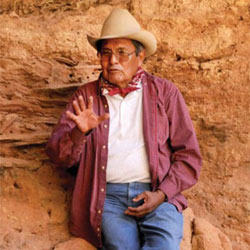 Harry Walters is a scholar, archaeologist, historian, Diné cultural consultant, teacher, and former director of the Diné College Historical Museum, which he held for 35 years before retiring in 2008. He attended the Institute of American Indian Arts, the Kansas City Art Institute, and the College of Santa Fe. Walters is from Cove, Arizona.
Harry Walters is a scholar, archaeologist, historian, Diné cultural consultant, teacher, and former director of the Diné College Historical Museum, which he held for 35 years before retiring in 2008. He attended the Institute of American Indian Arts, the Kansas City Art Institute, and the College of Santa Fe. Walters is from Cove, Arizona. Tanaya Winder is a poet, writer, artist and educator who was raised on the Southern Ute reservation in Ignacio, CO. An enrolled member of the Duckwater Shoshone Tribe, her background includes Southern Ute, Pyramid Lake Paiute, Diné, and Black heritages. Tanaya writes and teaches about different expressions of love (self love, intimate love, social love, community love, and universal love).
Tanaya Winder is a poet, writer, artist and educator who was raised on the Southern Ute reservation in Ignacio, CO. An enrolled member of the Duckwater Shoshone Tribe, her background includes Southern Ute, Pyramid Lake Paiute, Diné, and Black heritages. Tanaya writes and teaches about different expressions of love (self love, intimate love, social love, community love, and universal love).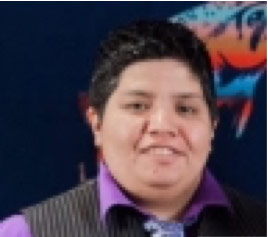 Celeste Adame, Muckleshoot, holds an M.F.A in poetry from the Institute of American Indian Arts in Santa Fe, New Mexico. Her thesis, Lovers Landscape, explores gender identity, sexuality, love, basketball, and landscapes of both Washington and New Mexico. Adame’s work has been published in the Yellow Medicine Review, As/Us: A Journal for Women of the World, hinchas de poesia, and the Santa Fe Literary Review. She was also one of the poetry editors for the first two editions of Mud City, the online literary review of the Institute of American Indian Arts’ Low Rezidency MFA program.
Celeste Adame, Muckleshoot, holds an M.F.A in poetry from the Institute of American Indian Arts in Santa Fe, New Mexico. Her thesis, Lovers Landscape, explores gender identity, sexuality, love, basketball, and landscapes of both Washington and New Mexico. Adame’s work has been published in the Yellow Medicine Review, As/Us: A Journal for Women of the World, hinchas de poesia, and the Santa Fe Literary Review. She was also one of the poetry editors for the first two editions of Mud City, the online literary review of the Institute of American Indian Arts’ Low Rezidency MFA program.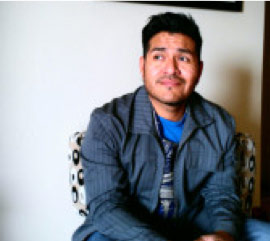 Byron Aspaas is Táchii’nii born for Tódích’íi’nii. He is from Upper Fruitland, New Mexico. Aspaas received an M.F.A. in nonfiction from the Institute of American Indian Arts in 2013. As a storyteller, he creates stories using vivid imagery, weaving personal experience of carded emotion into textiles of craft within each sentence. His journey includes becoming a teacher and a writer. He shares his personal emergence by evoking his memory through journals like: Weber: The Contemporary Southwest (Spring/Summer 2013), Yellow Medicine Review (Fall 2012, Spring 2012, Spring 2011), and 200 New Mexico Poems (Spring 2013). Aspaas currently resides in Colorado Springs with three cats, six dogs, and a human named Seth.
Byron Aspaas is Táchii’nii born for Tódích’íi’nii. He is from Upper Fruitland, New Mexico. Aspaas received an M.F.A. in nonfiction from the Institute of American Indian Arts in 2013. As a storyteller, he creates stories using vivid imagery, weaving personal experience of carded emotion into textiles of craft within each sentence. His journey includes becoming a teacher and a writer. He shares his personal emergence by evoking his memory through journals like: Weber: The Contemporary Southwest (Spring/Summer 2013), Yellow Medicine Review (Fall 2012, Spring 2012, Spring 2011), and 200 New Mexico Poems (Spring 2013). Aspaas currently resides in Colorado Springs with three cats, six dogs, and a human named Seth.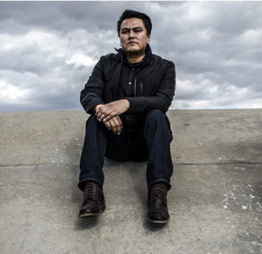 Sherwin Bitsui is Bįįh Bitoodni Tódích’íi’nii born for Tł’izí Lání; his maternal grandparents are the Kinyaa’áanii and his paternal grandparents are the Mą’íí Deeshgíízhíníí. Bitsui is from White Cone, Arizona. He is the author of Dissolve and Flood Song (Copper Canyon Press) and Shapeshift (University of Arizona Press). His honors include the 2011 Lannan Literary Fellowship, a Native Arts & Culture Foundation Fellowship for Literature, a PEN Open Book Award, an American Book Award, and a Whiting Writers Award. Bitsui teaches for the MFA in Creative Writing at the Institute of American Indian Arts.
Sherwin Bitsui is Bįįh Bitoodni Tódích’íi’nii born for Tł’izí Lání; his maternal grandparents are the Kinyaa’áanii and his paternal grandparents are the Mą’íí Deeshgíízhíníí. Bitsui is from White Cone, Arizona. He is the author of Dissolve and Flood Song (Copper Canyon Press) and Shapeshift (University of Arizona Press). His honors include the 2011 Lannan Literary Fellowship, a Native Arts & Culture Foundation Fellowship for Literature, a PEN Open Book Award, an American Book Award, and a Whiting Writers Award. Bitsui teaches for the MFA in Creative Writing at the Institute of American Indian Arts.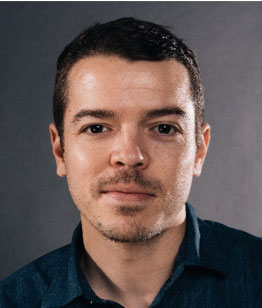 Austin Eichelberger is a native Virginian who teaches as much English and writing as he can manage in Santa Fe, New Mexico—when he’s not in class, he’s probably writing or taking photos. He completed his M.F.A. in fiction at the Institute of American Indian Arts in 2018, and over eighty pieces of his creative writing have been published by or are forthcoming from journals and anthologies including Flash: The International Short-Short Story Magazine, Pithead Chapel, and Nanoism. In 2017, he was nominated for a Pushcart, and his first solo exhibition, TYPEFACE, opened February 2019. More of his work lives at austineichelberger.com.
Austin Eichelberger is a native Virginian who teaches as much English and writing as he can manage in Santa Fe, New Mexico—when he’s not in class, he’s probably writing or taking photos. He completed his M.F.A. in fiction at the Institute of American Indian Arts in 2018, and over eighty pieces of his creative writing have been published by or are forthcoming from journals and anthologies including Flash: The International Short-Short Story Magazine, Pithead Chapel, and Nanoism. In 2017, he was nominated for a Pushcart, and his first solo exhibition, TYPEFACE, opened February 2019. More of his work lives at austineichelberger.com.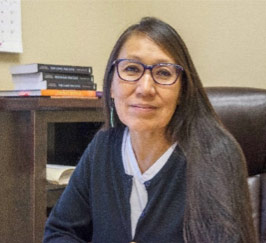 LaFrenda Frank is Kinyaa’áanii born for Naaneesht’ézhí Táchii’nii; her maternal grandparents are the Tódích’íi’nii and her paternal grandparents are the Tábąąhá. She is from Jeddito, Arizona. Frank received a B.A. in English and southwest studies from Fort Lewis College and an M.A. in English from Northern Arizona University. She is the current Editor in Chief for Salina Bookshelf in Flagstaff, Arizona and a former Diné College English Instructor. As an editor, she looks for books that accurately and authentically depicts Navajo (or Indigenous) people’s way of life to send a positive message about Native identity to readers. With the transmission of language and culture through books, Frank welcomes authentic voices for publication.
LaFrenda Frank is Kinyaa’áanii born for Naaneesht’ézhí Táchii’nii; her maternal grandparents are the Tódích’íi’nii and her paternal grandparents are the Tábąąhá. She is from Jeddito, Arizona. Frank received a B.A. in English and southwest studies from Fort Lewis College and an M.A. in English from Northern Arizona University. She is the current Editor in Chief for Salina Bookshelf in Flagstaff, Arizona and a former Diné College English Instructor. As an editor, she looks for books that accurately and authentically depicts Navajo (or Indigenous) people’s way of life to send a positive message about Native identity to readers. With the transmission of language and culture through books, Frank welcomes authentic voices for publication. Veronica Golos is the author of three poetry books: A Bell Buried Deep, Vocabulary Silence, and Rootwork. She is a core faculty poetry teacher for Tupelo Press and a reader for the Tupelo Press Dorset Prize. She has lectured at Columbia University’s Teacher’s College, Hunter College, Julliard School of Music, Regis University, University of New Mexico, and Colorado State University. Golos is also Consulting Acquisitions Editor for 3: A Taos Press; Co-editor of the Taos Journal of International Poetry & Art; and Co-poetry Editor for the Journal of Feminist Studies in Religion. Her work has been widely published and anthologized nationally and internationally, including Meridians, Drunken Boat, Orbus (London), and Liquor44 (Paris), among others.
Veronica Golos is the author of three poetry books: A Bell Buried Deep, Vocabulary Silence, and Rootwork. She is a core faculty poetry teacher for Tupelo Press and a reader for the Tupelo Press Dorset Prize. She has lectured at Columbia University’s Teacher’s College, Hunter College, Julliard School of Music, Regis University, University of New Mexico, and Colorado State University. Golos is also Consulting Acquisitions Editor for 3: A Taos Press; Co-editor of the Taos Journal of International Poetry & Art; and Co-poetry Editor for the Journal of Feminist Studies in Religion. Her work has been widely published and anthologized nationally and internationally, including Meridians, Drunken Boat, Orbus (London), and Liquor44 (Paris), among others. Rex Lee Jim is Kin Łichíi’nii born for Táchii’nii; his maternal grandparents are the Kinyaa’áanii and his paternal grandparents are the Naakaii Dine’é. Jim is from Rock Point, Arizona. A poet, playwright, and medicine man, Jim attended Princeton University, Middlebury Bread Loaf School of English, and Oxford University in England. He is fluent in Navajo, English, and Spanish. Although known mostly for his political career as former Navajo Nation Vice-President, Jim has extensive experience as a writer. He is an accomplished poet and has written three collections of poetry including: Saad Lá Tah Hozhóon (2019), which is a reprint of Jim’s trilingual collection of poetry titled Duchas Taa Koo Diné: a trilingual poetry collection in Navajo, Irish, and English (1998); Saad (1995); and Áhí Ni’Nikisheegiizh (1989). Jim continues to reside in his home community of Rock Point and he currently works at Diné College in Tsaile, Arizona.
Rex Lee Jim is Kin Łichíi’nii born for Táchii’nii; his maternal grandparents are the Kinyaa’áanii and his paternal grandparents are the Naakaii Dine’é. Jim is from Rock Point, Arizona. A poet, playwright, and medicine man, Jim attended Princeton University, Middlebury Bread Loaf School of English, and Oxford University in England. He is fluent in Navajo, English, and Spanish. Although known mostly for his political career as former Navajo Nation Vice-President, Jim has extensive experience as a writer. He is an accomplished poet and has written three collections of poetry including: Saad Lá Tah Hozhóon (2019), which is a reprint of Jim’s trilingual collection of poetry titled Duchas Taa Koo Diné: a trilingual poetry collection in Navajo, Irish, and English (1998); Saad (1995); and Áhí Ni’Nikisheegiizh (1989). Jim continues to reside in his home community of Rock Point and he currently works at Diné College in Tsaile, Arizona.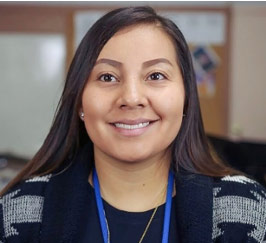 Boderra Joe is Bit’ahnii born for Tó’áhani. She is from Twin Lakes, New Mexico. Joe holds a B.F.A. in creative writing and an M.F.A. in poetry from the Institute of American Indian Arts. She currently serves as the Admissions/Outreach Assistant for the New Mexico School for the Arts High School in Santa Fe. She also teaches creative writing workshops for the Creative Writing & Literature Department. Joe previously worked as a freelance reporter for Gallup Sun Publishing newspaper in Gallup, New Mexico and at LAM Corporation, LLC in marketing. In her free time, she does freelance photography, mainly capturing landscape and family as they walk alongside her poetry of work. One day, she hopes to publish a book.
Boderra Joe is Bit’ahnii born for Tó’áhani. She is from Twin Lakes, New Mexico. Joe holds a B.F.A. in creative writing and an M.F.A. in poetry from the Institute of American Indian Arts. She currently serves as the Admissions/Outreach Assistant for the New Mexico School for the Arts High School in Santa Fe. She also teaches creative writing workshops for the Creative Writing & Literature Department. Joe previously worked as a freelance reporter for Gallup Sun Publishing newspaper in Gallup, New Mexico and at LAM Corporation, LLC in marketing. In her free time, she does freelance photography, mainly capturing landscape and family as they walk alongside her poetry of work. One day, she hopes to publish a book. Lawrence Lenhart is the author of The Well-Stocked and Gilded Cage (Outpost 19). His prose appears in publications like the Alaska Quarterly Review, Fourth Genre, Guernica, Gulf Coast, Passages North, Prairie Schooner, Western Humanities Review, and elsewhere. He teaches fiction and creative nonfiction at Northern Arizona University. Lenhart is an editor at DIAGRAM and a frequent writer for The Rumpus and Brazos Bookstore. He holds an M.F.A. from the University of Arizona.
Lawrence Lenhart is the author of The Well-Stocked and Gilded Cage (Outpost 19). His prose appears in publications like the Alaska Quarterly Review, Fourth Genre, Guernica, Gulf Coast, Passages North, Prairie Schooner, Western Humanities Review, and elsewhere. He teaches fiction and creative nonfiction at Northern Arizona University. Lenhart is an editor at DIAGRAM and a frequent writer for The Rumpus and Brazos Bookstore. He holds an M.F.A. from the University of Arizona. Manny Loley is ‘Áshįįhi born for Tó Baazhní’ázhí; his maternal grandparents are the Tódích’íi’nii and his paternal grandparents are the Kinyaa’áanii. Loley is from Casamero Lake, New Mexico and serves as an Adjunct Faculty in the School of Arts & Humanities at Navajo Technical University in Crownpoint, New Mexico. He holds an M.F.A. in fiction from the Institute of American Indian Arts and will be entering the Ph.D. in english and literary arts at the University of Denver in fall 2019. Loley is a founding member of Saad Bee Hózhǫ́: Diné Writers’ Collective, co-founder and co-director of the Emerging Diné Writers’ Institute, chair of the advisory board to the Navajo Nation Poet Laureate, and contributing fiction editor for Cloudthroat, an online literary publication. His work has appeared in the literary magazine HIKA, as part of Pollentongue: An Indigenous Poetry Salon and Reading, and is forthcoming in RED INK, Santa Fe Literary Review, and Diné Reader: an Anthology of Navajo Literature. In addition to a book of poems, Loley is at work on a novel titled They Collect Rain in Their Palms.
Manny Loley is ‘Áshįįhi born for Tó Baazhní’ázhí; his maternal grandparents are the Tódích’íi’nii and his paternal grandparents are the Kinyaa’áanii. Loley is from Casamero Lake, New Mexico and serves as an Adjunct Faculty in the School of Arts & Humanities at Navajo Technical University in Crownpoint, New Mexico. He holds an M.F.A. in fiction from the Institute of American Indian Arts and will be entering the Ph.D. in english and literary arts at the University of Denver in fall 2019. Loley is a founding member of Saad Bee Hózhǫ́: Diné Writers’ Collective, co-founder and co-director of the Emerging Diné Writers’ Institute, chair of the advisory board to the Navajo Nation Poet Laureate, and contributing fiction editor for Cloudthroat, an online literary publication. His work has appeared in the literary magazine HIKA, as part of Pollentongue: An Indigenous Poetry Salon and Reading, and is forthcoming in RED INK, Santa Fe Literary Review, and Diné Reader: an Anthology of Navajo Literature. In addition to a book of poems, Loley is at work on a novel titled They Collect Rain in Their Palms. Amber McCrary is Kin Łichíi’nii born for Naakaii Dine’é; her maternal grandparents are the ‘Áshįįhi and her paternal grandparents are the Ta’neeszahnii. She is from Shonto, Arizona. McCrary is a Diné poet, zinester, and feminist. She is a current M.F.A. candidate in the creative writing program at Mills College in Oakland, California. Her writing celebrates land, love, and living.
Amber McCrary is Kin Łichíi’nii born for Naakaii Dine’é; her maternal grandparents are the ‘Áshįįhi and her paternal grandparents are the Ta’neeszahnii. She is from Shonto, Arizona. McCrary is a Diné poet, zinester, and feminist. She is a current M.F.A. candidate in the creative writing program at Mills College in Oakland, California. Her writing celebrates land, love, and living.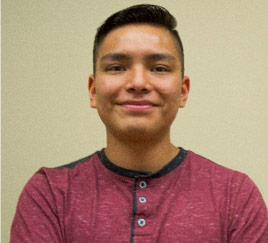 Tyler Mitchell is Tódích’íi’nii born for Honágháahnii; his maternal grandparents are the Mą’íí Deeshgíízhíníí and his paternal grandparents are the Kinyaa’áanii. He is from Tsaile, Arizona. Mitchell received his B.A. in English from Northern Arizona University and he is a member of the Saad Bee Hózhǫ́: Diné Writers’ Collective. He serves as the Executive Editor for Salina Bookshelf in Flagstaff, Arizona, which is an independent publishing company that specializes in Navajo and Hopi literature.
Tyler Mitchell is Tódích’íi’nii born for Honágháahnii; his maternal grandparents are the Mą’íí Deeshgíízhíníí and his paternal grandparents are the Kinyaa’áanii. He is from Tsaile, Arizona. Mitchell received his B.A. in English from Northern Arizona University and he is a member of the Saad Bee Hózhǫ́: Diné Writers’ Collective. He serves as the Executive Editor for Salina Bookshelf in Flagstaff, Arizona, which is an independent publishing company that specializes in Navajo and Hopi literature.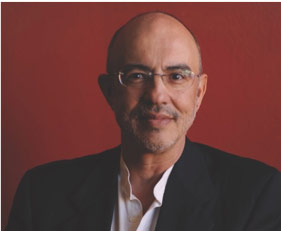 David Pérez is a writer, editor, actor, playwright, radio show host, and author of two memoirs: WOW! (11B Press, 2011) and WOW! 2 (Nighthawk Press, 2016). He has been selected as “One of the Top Ten Latino Authors to Watch and Read” by latinostories.com and the ebook edition of WOW! won a Gold Medal for multicultural non-fiction in the Global Ebook Awards. Pérez has edited numerous award-winning memoirs and also teaches workshops on the Art of Reading Your Work Aloud. He lives in Taos, New Mexico.
David Pérez is a writer, editor, actor, playwright, radio show host, and author of two memoirs: WOW! (11B Press, 2011) and WOW! 2 (Nighthawk Press, 2016). He has been selected as “One of the Top Ten Latino Authors to Watch and Read” by latinostories.com and the ebook edition of WOW! won a Gold Medal for multicultural non-fiction in the Global Ebook Awards. Pérez has edited numerous award-winning memoirs and also teaches workshops on the Art of Reading Your Work Aloud. He lives in Taos, New Mexico. Jake Skeets is Tsi’naajínii born for Tábąąhá; his maternal grandparents are the Táchii’nii and his paternal grandparents are the Tódík’ózhí. Skeets is from Vanderwagen, New Mexico. He holds an M.F.A. in poetry from the Institute of American Indian Arts. Skeets is a winner of the 2018 Discovery/Boston Review Poetry Contest and has been nominated for a Pushcart Prize. Skeets edits an online publication called Cloudthroat and organizes a poetry salon and reading series called Pollentongue, based in the Southwest. He is a member of Saad Bee Hózhǫ́: Diné Writers’ Collective and currently teaches at Diné College in Tsaile, Arizona. He is the author of Eyes Bottle Dark with a Mouthful of Flowers, forthcoming in September 2019.
Jake Skeets is Tsi’naajínii born for Tábąąhá; his maternal grandparents are the Táchii’nii and his paternal grandparents are the Tódík’ózhí. Skeets is from Vanderwagen, New Mexico. He holds an M.F.A. in poetry from the Institute of American Indian Arts. Skeets is a winner of the 2018 Discovery/Boston Review Poetry Contest and has been nominated for a Pushcart Prize. Skeets edits an online publication called Cloudthroat and organizes a poetry salon and reading series called Pollentongue, based in the Southwest. He is a member of Saad Bee Hózhǫ́: Diné Writers’ Collective and currently teaches at Diné College in Tsaile, Arizona. He is the author of Eyes Bottle Dark with a Mouthful of Flowers, forthcoming in September 2019. Roanna Shebala is Tsénjíkíní born for Deeshchíí’nii; her maternal grandparents are the Tótsohnii and her paternal grandparents are the Naasht’ézhi Dine’é. She is from Fort Defiance, Arizona. Shebala earned her B.S. in theater at Northern Arizona University and is a current M.F.A. in creative writing student at the Institute of American Indian Arts in Santa Fe, New Mexico. She is a spoken word artist who has been featured on four National Poetry Slam teams, five-time representative on the Women of the World Poetry Slam team, and a two-time representative for the Individual of the World Poetry Slam. Her work has been featured in Button Poetry, Indian Country Today, in various zines, and magazines such as Annick Press, Red Ink, Wicked Banshee Press, and Suspect Press. Shebala has performed her spoken word poetry at the Lincoln Center for the Out of Doors Project and nationally. She credits her father for gifting her with storytelling; her work combines story, poetry, and performance. She is also a member of Saad Bee Hózhǫ́: Diné Writers’ Collective.
Roanna Shebala is Tsénjíkíní born for Deeshchíí’nii; her maternal grandparents are the Tótsohnii and her paternal grandparents are the Naasht’ézhi Dine’é. She is from Fort Defiance, Arizona. Shebala earned her B.S. in theater at Northern Arizona University and is a current M.F.A. in creative writing student at the Institute of American Indian Arts in Santa Fe, New Mexico. She is a spoken word artist who has been featured on four National Poetry Slam teams, five-time representative on the Women of the World Poetry Slam team, and a two-time representative for the Individual of the World Poetry Slam. Her work has been featured in Button Poetry, Indian Country Today, in various zines, and magazines such as Annick Press, Red Ink, Wicked Banshee Press, and Suspect Press. Shebala has performed her spoken word poetry at the Lincoln Center for the Out of Doors Project and nationally. She credits her father for gifting her with storytelling; her work combines story, poetry, and performance. She is also a member of Saad Bee Hózhǫ́: Diné Writers’ Collective. Dr. Laura Tohe is Tsénahabiłnii born for the Tódich’inii. She grew up at the base of the Chuska Mountains in Crystal, New Mexico. Dr. Tohe earned her B.A. from the University of New Mexico and her M.A. and Ph.D. in creative writing and literature from the University of Nebraska in Lincoln. Dr. Tohe is the author of Making Friends with Water; No Parole Today (named Poetry Book of the Year by the Wordcraft Circle of Native American Writers and Storytellers); Sister Nations: Native American Women Writers on Community, co-edited with Heid Erdrich; Tseyí Deep in the Rock, in collaboration with photographer, Stephen Strom (received the Arizona Book Association’s Glyph Award for Best Poetry and Best Book); and Code Talker Stories. The Phoenix Symphony commissioned her to write the libretto for “Enemy Slayer, A Navajo Oratorio,” which made its 2008 world premiere as part of the Phoenix Symphony’s 60th anniversary. A compact disc recording of “Enemy Slayer” is on the Naxos classical music label. It received rave reviews by the Arizona Republic and was called “a triumph” by Opera Today. Her other awards include the Dan Schilling Public Scholar Award by the Arizona Humanities. Dr. Tohe is professor emeritus for Arizona State University and she is the current Navajo Nation Poet Laureate.
Dr. Laura Tohe is Tsénahabiłnii born for the Tódich’inii. She grew up at the base of the Chuska Mountains in Crystal, New Mexico. Dr. Tohe earned her B.A. from the University of New Mexico and her M.A. and Ph.D. in creative writing and literature from the University of Nebraska in Lincoln. Dr. Tohe is the author of Making Friends with Water; No Parole Today (named Poetry Book of the Year by the Wordcraft Circle of Native American Writers and Storytellers); Sister Nations: Native American Women Writers on Community, co-edited with Heid Erdrich; Tseyí Deep in the Rock, in collaboration with photographer, Stephen Strom (received the Arizona Book Association’s Glyph Award for Best Poetry and Best Book); and Code Talker Stories. The Phoenix Symphony commissioned her to write the libretto for “Enemy Slayer, A Navajo Oratorio,” which made its 2008 world premiere as part of the Phoenix Symphony’s 60th anniversary. A compact disc recording of “Enemy Slayer” is on the Naxos classical music label. It received rave reviews by the Arizona Republic and was called “a triumph” by Opera Today. Her other awards include the Dan Schilling Public Scholar Award by the Arizona Humanities. Dr. Tohe is professor emeritus for Arizona State University and she is the current Navajo Nation Poet Laureate.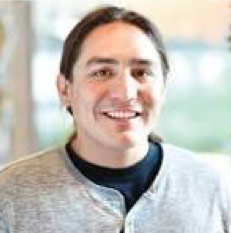 Daniel Vandever is Dághaałchíí’ Dine’é born for Kinyaa’áanii; his maternal grandparents are the Dághaałchíí’ Dine’é and his paternal grandparents clan is the Táchii’nii. He is from Haystack, New Mexico at the base of Tsoodził. Vandever is the author and illustrator of “Fall in Line, Holden!” (Salina Bookshelf Press), a children’s book detailing a young Navajo boy’s day at a boarding school. Vandever serves as Director of Communications for Navajo Technical University, where he handles strategic communication efforts for marketing, advertising, and public relations. He holds an M.A. in community and regional planning from the University of New Mexico and a B.A. from the University of Missouri. He volunteers for the Navajo Weaver’s Association, providing his marketing expertise to the internationally known Rug Auction in Crownpoint, New Mexico.
Daniel Vandever is Dághaałchíí’ Dine’é born for Kinyaa’áanii; his maternal grandparents are the Dághaałchíí’ Dine’é and his paternal grandparents clan is the Táchii’nii. He is from Haystack, New Mexico at the base of Tsoodził. Vandever is the author and illustrator of “Fall in Line, Holden!” (Salina Bookshelf Press), a children’s book detailing a young Navajo boy’s day at a boarding school. Vandever serves as Director of Communications for Navajo Technical University, where he handles strategic communication efforts for marketing, advertising, and public relations. He holds an M.A. in community and regional planning from the University of New Mexico and a B.A. from the University of Missouri. He volunteers for the Navajo Weaver’s Association, providing his marketing expertise to the internationally known Rug Auction in Crownpoint, New Mexico.